|
July 9, 2016 - No. 28
Canada Post's
Vicious,
Immoral and
Irrational Blackmail of Postal Workers
Hold Canada Post
and the Trudeau
Government to Account for Any Harm that Comes to Postal Workers!
 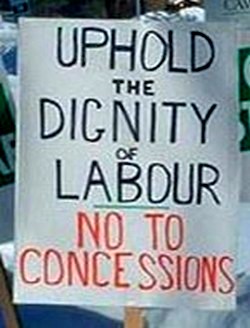
Trudeau
Government's
Fraudulent
Electoral
Reform
Program
• CPC(M-L) Launches Ambitious Battle
for Democratic Renewal
• "It's Your Democracy" -- Using and
Abusing the Big Lie Technique
• Government's Program for
Consultation on Electoral Reform
• Perfunctory House of Commons Special
Committee
• Significance of Liberal Party's
Transformation of "Members" and "Supporters" into "Registered
Liberals"
- Anna Di Carlo -
• Liberal Party's New Constitution
NATO War Summit in
Warsaw, Poland
• All Out to Oppose NATO and Its
War Preparations!
Dismantle NATO! Get Canada Out of NATO!
• No Canadian Troops in the Baltics and Eastern
Europe!
- Dougal MacDonald -
For Your
Information
• Overview of NATO War Summit
Third Anniversary of
Lac-Mégantic Tragedy
• Build a Public Authority that
Defends the Public Interest,
Not Private Monopoly Interest!
• Mass Rally in Lac-Mégantic
for Rail Safety
Interviews
• New Rail Line Bypassing Town Centre Needed
Soon
- Robert Bellefleur, Spokesperson,
Coalition of Citizens
and Groups for Rail Safety -
• Workers Still Under Framework Where Railways
Create and Enforce Their Own Rules
- Brian Stevens, Unifor National Rail Director -
• Massive Layoff of CP
Maintenance Workers
Jeopardizes Rail Lines and Public
Safety
- Wade Phillips, Director, Eastern Region, Teamsters
Canada
Rail Conference, Maintenance of Way Employees Division -
• Monopolies' Plans for Cameras to Monitor
Train Crews
Threaten Privacy
and Safety
- Don Ashley, National Legislative Director,
Teamsters Canada
Rail Conference -
Canada Post's Vicious, Immoral and
Irrational
Blackmail of Postal Workers
Hold Canada Post and the
Trudeau Government to Account
for
Any Harm that Comes to Postal Workers!
As the deadline for the lockout of postal workers by
Canada Post approaches it is clear that the corporation has decided to
proceed in a spirit of revenge against postal workers and their union.
It is not only preparing to impose severe rollbacks but is seeking to
overwhelm postal workers with irrational demands such as that
management can set whatever working conditions it wants. This attempt
to use their corporate power to deprive the postal workers of their
right to working conditions commensurate with the work they perform is
not only vindictive -- it is irrational. The post office has a century
of
experience in the kind of working conditions required to run the postal
service. There is a modern way of doing things which takes the needs of
human beings into account. The corporation's calculations that it can
impose its agenda by smashing the workers' resistance and their fight
for the rights of all is self-serving and cannot be accepted.
 Using the threat of a
lockout -- which the corporation
has
now postponed from midnight July 8 to 12:01 am on July 11, 2016
-- it seeks to make the attacks on the rights of the workers a fait
accompli. These attacks are referred to as
"negotiations" by the monopoly media and the likes of the Trudeau
government. Using the threat of a
lockout -- which the corporation
has
now postponed from midnight July 8 to 12:01 am on July 11, 2016
-- it seeks to make the attacks on the rights of the workers a fait
accompli. These attacks are referred to as
"negotiations" by the monopoly media and the likes of the Trudeau
government.
The latest evidence of Canada Post's depravity came on
Wednesday, July 6, 2016, when management began posting a letter
on work floors across the country announcing their intention to
unilaterally declare working conditions in direct violation of
the present conditions of employment.
The letter reveals that although the corporation issued
a
72-hour notice of lockout to the union, this does not mean that
Canada Post will stop operating. Far from it, Canada Post says it
will comply with basic requirements stipulated in the Canada
Labour Code and the workers must come under this dictate.
The letter states, "As of Friday, July 8, 2016, (now
changed
to Monday, July 11, 2016) the terms and conditions of the current
collective agreements will no longer apply. Under the new terms
and conditions, employees will continue to receive their regular
pay and some benefits such as applicable prescription drug
coverage. Other items will be cancelled in line with the
statutory minimum conditions established under the Canada
Labour Code. The Corporation will also have the flexibility
to adjust staffing according to the amount of work required."
(CPC(M-L) emphasis.)
This is a grave provocation. According to the
corporation,
postal workers must report to work once the deadline for lockout
has passed and face the arbitrary rule of Canada Post management
which is one-sided, self-serving and irrational. Canada Post
thinks it can operate the post office by eliminating
organizational structures and working conditions which have been
developed over decades, all for the purpose of imposing a
corporate agenda on the workers. This is the level to which the
corporation has sunk. To boot, it arrogantly calls this part of
the "negotiations process."
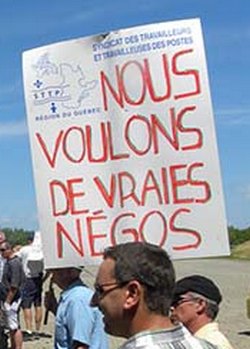 Canada Post's letter
reveals the depravity of Canada
Post
management. Far from taking responsibility for its workforce
which is fighting to uphold its hard won rights, it claims that
this action is necessary because "[t]he uncertainty caused by the
prolonged negotiations and the union's strike mandate is having a
negative and escalating impact on the postal service." Canada Post's letter
reveals the depravity of Canada
Post
management. Far from taking responsibility for its workforce
which is fighting to uphold its hard won rights, it claims that
this action is necessary because "[t]he uncertainty caused by the
prolonged negotiations and the union's strike mandate is having a
negative and escalating impact on the postal service."
To claim that such self-serving poppycock is the
"truth"
shows what Canadians are up against when monopolies can use their
power to impose private interests on the public. The fact is that
for the past few months representatives of Canada Post have been
going around the country advising their customers to use other
means to do their mailing. Canadians have heard this. What is the
significance? The significance is that since the beginning of
negotiations it is the corporation that has been threatening to
close the doors of the post office if management does not get its
way. In fact, it is only the spokespersons of Canada Post who
have repeatedly talked about this "disruption of postal
services," for which they blame the union, even though it is the
corporation that has refused to negotiate at the "negotiations
table."
Meanwhile, the Trudeau government is pretending to be
neutral
although, in fact, it is playing the game of the corporation.
Prime Minister Justin Trudeau said the government is not
considering back-to-work legislation if there is a work stoppage
at Canada Post. The government "believes in good-faith
negotiations that happen around the bargaining table," he said.
Referring to back-to-work legislation, Trudeau said there is no
need to be "heavy-handed."
What about blackmail which threatens that if postal
workers
do not comply with the arbitrary dictate of managers on the shop
floor they will be criminalized? Is that how the rule of law now
operates under the Liberal regime? Canada Post's letter has no
other intent than to break the resistance of the workers and
their union. Is that not "heavy-handed?"
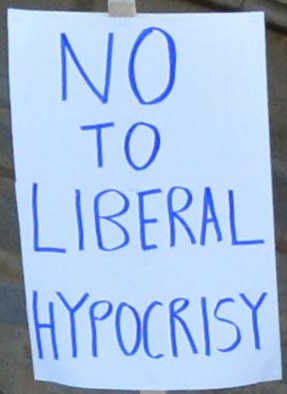 Is the job of the government
to support the corporation
under
the pretense that it is "neutral" when it should be upholding
public right? Negotiations are also inscribed in labour law and
require good-faith bargaining and fairness. Unless they are
premised on respect for workers' rights, not the use of corporate
might to impose a corporate agenda to the detriment of the
workers and society, there is no use pretending the law is worthy
of any respect whatsoever. Is the job of the government
to support the corporation
under
the pretense that it is "neutral" when it should be upholding
public right? Negotiations are also inscribed in labour law and
require good-faith bargaining and fairness. Unless they are
premised on respect for workers' rights, not the use of corporate
might to impose a corporate agenda to the detriment of the
workers and society, there is no use pretending the law is worthy
of any respect whatsoever.
The so-called neutral, anti-heavy-handed position of
the
Trudeau government is contemptible and exposes a profound
hypocrisy and prejudice in favour of Canada Post's privatization
agenda. It is clear that the Trudeau government has decided to
allow the most vicious attacks on postal workers and call it
"good-faith negotiations."
The government must be made to answer for its alleged
neutrality. It must take responsibility for its failure to answer
for the kind of society it is presiding over which allows such
flagrant attacks on workers and their rights. Are these criminal
attacks of the corporation against the workers examples of
"common values" the Trudeau government has declared unite us on
the eve of the 150th anniversary of Confederation?
The Communist Party of Canada (Marxist-Leninist) calls
on
Canadians from all walks of life to tell their Members of
Parliament that this is not acceptable. CPC(M-L) calls on all
union centrals and locals to demand an end to this charade.
What outcome do Canada Post and the government expect
from
this threat to impose the so-called minimum standards of the Canada
Labour Code on Canada's postal workers as of
12:01
am on July 11? The corporation has refused to negotiate anything.
It has from the start of the negotiating process imposed its
demands which are unacceptable to the postal workers. Does it
really think the postal workers are just going to agree with
this? Is this the new normal in Canada that workers can only have
a job if they give up their rights and their conscience?
 Any public authority worthy
of the name would intervene
and
stop Canada Post from issuing such blackmail and acting with
impunity. The corporation should be charged with fomenting
anarchy and chaos in the post office and held responsible for the
consequences which result from this imposition. Any public authority worthy
of the name would intervene
and
stop Canada Post from issuing such blackmail and acting with
impunity. The corporation should be charged with fomenting
anarchy and chaos in the post office and held responsible for the
consequences which result from this imposition.
CPC(M-L) calls on Canadians to oppose any attempt to
criminalize postal workers who defend their working conditions.
These working conditions must be conducive to doing their job
safely and with dignity. Canada Post and the Trudeau government
must be held to account should any harm come to the workers as a
result of refusing unsafe work, including full compensation
should they be sent home under any pretext whatsoever.
Canadian workers are fighting to defend their rights in
all
sectors of the economy. Monopoly corporations dictate the terms
of work, pay, pensions and benefits and even whether the
monopolies pay taxes or environmental cleanup bills. There is
no due process for the workers to defend their interests.
Insolvency courts declare that the Boards of Directors of the
companies have businesspeople who are best-versed in telling the
court what should be done. Governments take the same approach. It
must not pass. It is the fight of the workers for their own
wages, working conditions, pensions and benefits which defends
the rights of all.
Let Us Together Take a Bold Step in
Defence
of the
Rights of All!
Say No to Canada Post! Stand with the Postal
Workers to Defy the Unacceptable and Immoral Position of Canada
Post and the Trudeau Government!
The Time to Take a Principled
Stand Is Now!

Trudeau Government's Fraudulent Electoral
Reform Program
CPC(M-L) Launches Ambitious Battle for
Democratic Renewal
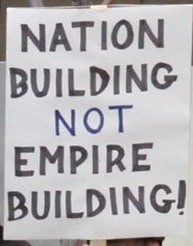 
Leading up to the 150th anniversary of Confederation in
2017, the Communist Party of Canada (Marxist-Leninist) calls upon
the people to join its year-long program for democratic renewal.
The Party launched the program with a highly successful public
conference in Vancouver on June 25. The Vancouver Conference
reflected the desire of the Party to involve citizens and
residents from all walks of life in the work for democratic
renewal and a modern constitution. Further conferences are
planned throughout the country and Canadians are urged to join
the battle for democracy and put the Party at their disposal for
this important work.
The people's initiative is crucial in all things
political.
The ruling elite are trying to overwhelm Canadians with a set
agenda of political reforms to "restore the credibility" of
political parties, elections and Parliament, as they put it. The
time is now for everyone to put forward their own proposals
rather than allow themselves to be overwhelmed with a set of
pre-defined choices coming from the Prime Minister's Office that
are meant to block any political movement from emerging that
holds high a pro-social agenda to renew the democracy in the people's
favour.
Let's Get Together and Discuss!
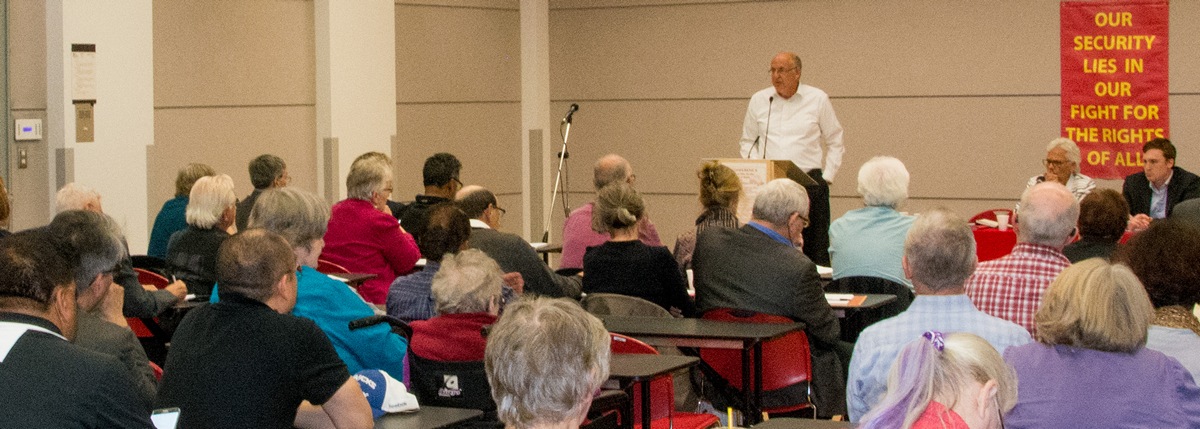
MLPC President Rolf Gerstenberger addresses the Party's Vancouver
conference, June 25, 2016.
CPC(M-L) bases its program for democratic renewal on
involving the people in politics. The people themselves must be
political for democratic renewal to become a reality. The working
people must put themselves at the centre of political life in
Canada. They must be the architects of their own nation-building
project that affirms their sovereignty and empowerment.
Otherwise, the ruling elite who hold power will block the people
from participating in politics and grind them down even further
as voting cattle to be targeted and abused every four years by
the mass media and public relations firms masquerading as
political parties.
 Rolf Gerstenberger,
President of the Marxist-Leninist
Party
of Canada, the electoral name of CPC(M-L), and former President
of United Steelworkers Local 1005 in Hamilton opened the
Conference in Vancouver with a spirited presentation: "What Kind
of Democracy for Canada -- The Challenge the Workers Accept."
What kind of democracy indeed, Rolf said, that for every single
day of the last 150 years, the ruling elite have made the biggest
effort not to involve workers and others in politics but to
discourage them and attack them if they dare organize to express
their views as individuals or in their collectives. Rolf gave
example after example of how organized workers wanting to solve
the economic problems they face and those of their enterprises
and communities are rebuffed and ridiculed and denied any voice
in the political process or the solving of problems. Rolf Gerstenberger,
President of the Marxist-Leninist
Party
of Canada, the electoral name of CPC(M-L), and former President
of United Steelworkers Local 1005 in Hamilton opened the
Conference in Vancouver with a spirited presentation: "What Kind
of Democracy for Canada -- The Challenge the Workers Accept."
What kind of democracy indeed, Rolf said, that for every single
day of the last 150 years, the ruling elite have made the biggest
effort not to involve workers and others in politics but to
discourage them and attack them if they dare organize to express
their views as individuals or in their collectives. Rolf gave
example after example of how organized workers wanting to solve
the economic problems they face and those of their enterprises
and communities are rebuffed and ridiculed and denied any voice
in the political process or the solving of problems.
Thousands of steelworkers and others such as Nortel and
forestry workers have had their retirement benefits and pensions
stolen from them with the stroke of a judge's pen under Canada's
fraudulent corporate bankruptcy process. The political parties in
power and governments say their hands are tied and can do
nothing. Doing nothing, not solving problems is not politics,
Rolf said. It is anti-politics; it is anti-people and
anti-democratic. If the working people were in power they would
not allow such crimes of the monopolies to continue. In Alberta,
100,000 people are laid off because of oil prices that are
supposedly out of our control and oil monopolies that are beyond
the reach of government and the people, and this is considered
"business as usual." This is only "business as usual" because the
people are denied their right to be political, denied their right
to a say and to be in control of their lives and all those
matters that affect their lives.
In Montreal, municipal workers have been charged as
common criminals for standing up and stating and demonstrating publicly
that governments have turned their collective agreements into so much
garbage. The big monopolies, private or public, such as U.S. Steel, the
cities or Canada Post say "take it or leave it" and if the unions do
not agree to concessions they are punished with lockouts and
criminalized. This would not be considered acceptable in a democracy
where people have rights that are guaranteed. Those defining our rights
today and those deciding our fate today -- the government officials,
judges and executives of the big corporations -- are not our peers,
they do not share weal and woe with us, they do not work beside us in
the mills, hospitals, educational institutions, offices, public
services, forests, factories and mines. Their interests and views clash
with those of the working people, Rolf said, yet they are in power and
that is what has to change, that is what democratic renewal has to
change and it is up to us the people to make it happen.
National Leader of the MLPC Anna Di Carlo and a
representative of Youth for Democratic Renewal also addressed the
Conference followed by many interventions from the audience.
Modern Definition of Rights
The Conference discussed a modern definition of rights
that
centres on the reality that people have rights by virtue of being
human. In Canada, a modern definition of rights has never
materialized officially because people are marginalized from
power. Democratic renewal must challenge the status quo where
rights are defined outside a government of laws by the arbitrary,
prerogative powers of the state, also known as the police powers.
These powers were exercised in defence of the British Empire at
the time of Confederation and today on behalf of U.S. imperialism
and the global monopolies that dominate the people and country.
With the society organized without a government of laws defining
and guaranteeing rights, the rights of the people are subject to
self-serving "reasonable limits."
When it comes to deciding the direction of the economy
and
foreign policy no rights of the people are recognized, as all
power rests with monopoly right. Free trade agreements and
military alliances subordinate Canada within the imperialist
system of states and negate the right of Canadians to decide on
political, military, economic, social and environmental
matters.
Regarding rights, whoever decides the conception and
definition of rights and writes the constitution, the basic law,
also defines what kind of democracy exists. The police power has
always defined rights in Canada -- in the 19th century to
defend British colonial rights and now to defend monopoly right
within the U.S.-dominated imperialist system of states. A modern
definition of rights and a concrete guarantee of rights and
duties by a government of laws subject to the sovereign people
within a modern constitution are central to democratic
renewal.
Removing the Gatekeepers of Power
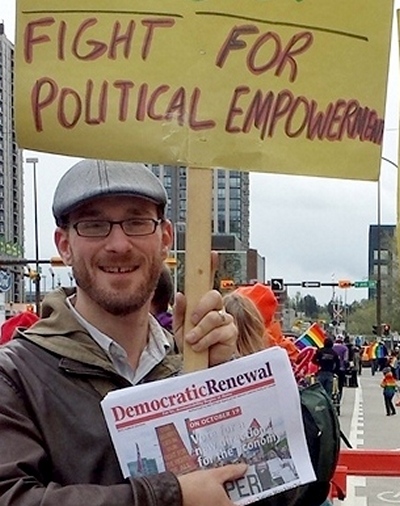 Participants in the
conference discussed that when it
comes
to the reform of the electoral system, the ruling elite in
Parliament through the Committee now in session want to ensure no
public discussion takes place on what is required today to
guarantee the right to elect and be elected. How is such a right
concretized, which includes the right to an informed vote and
assurances that elected representatives and the democratic
institutions are subordinate to the electorate? Participants in the
conference discussed that when it
comes
to the reform of the electoral system, the ruling elite in
Parliament through the Committee now in session want to ensure no
public discussion takes place on what is required today to
guarantee the right to elect and be elected. How is such a right
concretized, which includes the right to an informed vote and
assurances that elected representatives and the democratic
institutions are subordinate to the electorate?
The Committee of Parliament under the direction of the
PMO insists that people line up behind one of three options for how
votes are counted: first-past-the-post, proportional representation, or
ranked ballots. This is not discussion, participants in the Conference
pointed out; this belittles the discussion on democratic renewal and
blocks conscious participation. Presenting a ready-made agenda and
choices is similar to the presentation of cartel party agendas and
their candidates on election ballots and all the media hoopla and
advertising that goes into the current election process. The three
choices reflect the preferences of the cartel parties in the House of
Commons, which support one or other of the choices based on
self-serving calculations to ensure their victory in elections. The
Parliamentary Committee and cartel parties are determined to block
discussion and discourage people from participating in democratic
renewal. It is up to the people to turn this around; no one else is
going to do it for us.
The Role of the Working Class Movement
Discussion took place on how the political parties of
the
ruling elite have long been used to split the working class along
party lines. Instead of the working class presenting one of their
peers to be elected, for example a worker activist with a proven
history of leadership, workers are divided along party lines and
agendas over which they have no control.
 The working class is
humiliated as a special interest group and denied the dignity and
position of honour as the actual producers of value on which the people
and society rely for their existence. Democratic renewal must ensure
that the actual producers, the working people, can exercise control
over the direction of the economy and all those economic, political,
military and social affairs that affect their lives. The working class is
humiliated as a special interest group and denied the dignity and
position of honour as the actual producers of value on which the people
and society rely for their existence. Democratic renewal must ensure
that the actual producers, the working people, can exercise control
over the direction of the economy and all those economic, political,
military and social affairs that affect their lives.
The cartel political parties in power and opposition no
longer serve as primary political organizations but on the
contrary act as gatekeepers of power. They block people from
thinking about, discussing and participating with their peers
consciously and actively in politics and democratic renewal.
How the people remove the gatekeepers from blocking
them from
participating in politics and from political power was an
important question on the minds of the participants in the
Conference. The crucial factor at this time is for everyone to
become involved in the discussion on democratic renewal and
present their views.
The MLPC has given the executive members of the MLPC
and Youth for
Democratic
Renewal the task of speaking to workers and their allies across the
country as well as
involving the youth. In this role Rolf invites individuals and groups
to join with CPC(M-L) to
organize meetings so that the discussion on democratic renewal can be
broadened and become
a real force for pro-social change.

"It's Your Democracy" --
Using and Abusing the Big Lie
Technique
CPC(M-L) calls on Canadians to reject
the Liberal
government's assault
on their consciousness and its imposition of
predetermined choices
referred to as electoral reform.
The government of Canada on July 6 launched its
official
guidelines for participating in discussions on reform to the
electoral system in an attempt to prevent Canadians from going
outside the narrow confines of discussing the "choices"
predetermined by the Prime Minister's Office and cartel party
system.
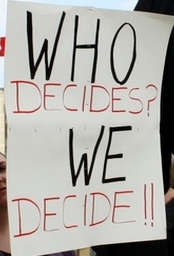 This coincided with
Minister of Democratic Institutions
Maryam Monsef appearing before the House of Commons Special
Committee as a witness to present the guidelines and state that
the first-past-the-post system should be replaced. The fact that
the Minister, the Cabinet and Prime Minister's Office have jumped
ahead of the Special Parliamentary Committee to declare the
agenda for consultations and how electoral reform is to be
discussed makes a clear statement about how the Trudeau
government intends to control the so-called democratic
process. This coincided with
Minister of Democratic Institutions
Maryam Monsef appearing before the House of Commons Special
Committee as a witness to present the guidelines and state that
the first-past-the-post system should be replaced. The fact that
the Minister, the Cabinet and Prime Minister's Office have jumped
ahead of the Special Parliamentary Committee to declare the
agenda for consultations and how electoral reform is to be
discussed makes a clear statement about how the Trudeau
government intends to control the so-called democratic
process.
The irony is that all of it is done in the name of
eliminating elitism and hierarchy, while being a quintessential
expression of elitism and hierarchy itself. It is done in the
name of "modernizing the system," the meaning of which is
eliminating the human factor/social consciousness in favour of
turning the polity into a giant Facebook page where people can
click their "likes" and "dislikes" and algorithms calculate the
outcome of where Canadians allegedly stand.
The government's guidelines set out in detail the
marketing
methods employed by the neo-liberal ruling elite to calculate how
Canadians should think and about what. Their participation in
politics is reduced to the most ridiculous choices provided by
marketing consultants. The problems of democracy are reduced to
calculating phoney majorities put together on a fraudulent basis.
How citizens should view Canada's electoral and political system,
what questions they should ask about official proposals and even
the way they should talk to others, hold meetings and what to
write on Twitter are all predetermined by the private consultants
and provided for consumption.
The guidelines claim to be non-partisan, bipartisan,
modern and all kinds of other silly things which have no meaning within
any context other than within the boardrooms of the corporations and
think-tanks that are making a killing by privatizing public governance
in the so-called democratic countries. The questions, the methods and
the results are all based on the neo-liberal outlook of the ruling
elite and are designed to smash the people's political movement in
defense of their rights and the rights of all. A disempowered
electorate which has no means of exercising control over the decisions
which affect the lives of the people and the fate of the country is the
last thing a country like Canada needs. This is a time when the
imperialist system of states to which Canada belongs is preparing for a
new redivision of the world. Anarchy and violence have seized hold of
the United States and Europe, causing untold suffering and havoc
everywhere.
The basic framework of the so-called guidelines issued
by the
Liberal government is to stop Canadians from drawing conclusions
based on their direct experience and thinking about how problems
pose themselves concretely. The program of so-called consultation
begins by attempting to saturate Canadians with the big lie,
"It's your democracy and your government." Dogmas are imposed in
the form of phrases such as the following: "Canada has a strong
and deeply rooted democracy" and "Federal electoral reform is
part of the Government's stronger democracy agenda."
This is a time when Canadians need to exercise control
over
the decisions which affect their lives. This includes the
direction of the economy and matters related to wages, benefits,
pensions and working conditions. It also concerns all matters
related to the key problems of war and peace. The Trudeau
Liberals are taking the country from an unacceptable situation
which reduces the citizenry to voting once every four years, to
one in which they exercise no control whatsoever over the
decisions imposed on them by the elites in power. The government
is so pathetic that it declares, "The electoral system is
more than vote casting and counting -- it is a way for Canadians
to influence their future, give their consent to be governed, and
hold their representatives accountable."
This is precisely what the current political process
does not permit Canadians to do and what the methods the Liberals are
introducing to consult Canadians also will not permit them to do. The
time for Canadians to rely on their own discussions and efforts to
establish the kind of democratic renewal Canada requires is now. The
need for democratic renewal must be discussed and in this manner
brought into being.
Canadians need to work out the pertinent questions for
themselves and demand answers from the government. For instance,
if the electoral system is more than vote counting, why has the
government set strict limits on the discussion so that it is
reduced to picking one of three methods of counting votes?
Such methods might dazzle the social base of the cartel
parties which are keen to battle it out between themselves to
make sure their variant wins the competition, but they have
nothing to do with gauging what Canadians want or need. To give a
series of vague criteria for how Canadians should choose from
amongst the predetermined choices the government is presenting is
infantile. The clincher is that Canadians are asked only to
consider the "proposed reforms." Who proposed these reforms,
based on what considerations is not discussed. Canadians are not
given the opportunity to propose reforms based on solving the
problems they face, which makes the pious phrase that "It's your
democracy and your government" ring hollow indeed.
The government's guidelines aim to prevent discussion
from taking place. They reduce the role of human beings to that of
on-line shoppers who are to select what they want from a list of
predetermined choices that do not serve them. Far from permitting this
process to marginalize and railroad them into irrelevancy, the people
of this country can make a real difference by working out their own
opinions on these matters amongst their peers in the workplaces,
educational institutions, neighbourhoods and where seniors congregate.
CPC(M-L) is at the disposal of Canadians from all walks
of
life to assist in this work with the aim of making sure their
concerns and aspirations are not marginalized and their right to
conscience is not criminalized. Join in the work for democratic
renewal!

Government's Program for Consultation on
Electoral Reform
On July 6 the Government of Canada launched
publications
and a new website for Canadians to "Learn about Canadian federal
electoral reform" and "Participate in Canadian federal electoral
reform consultations." At the same time a new official Twitter
account was created called Canadian Democracy to promote the
material and the hashtag "#GetInvolvedinER." Minister of
Democratic Institutions Maryam Monsef appeared before the House
of Commons Special Committee on Electoral Reform the same day to
present the material and government's program.
All of this makes it clear that the government is
sidestepping
the Parliamentary electoral reform committee established on June
7 and proceeding with its own program, before the Committee can
decide its own guidelines and consultation process. This is
despite the fact that the government says it will "complement the
work of the parliamentary committee." In the same vein, before
the Committee was established the Liberals appointed two advisors
to the Privy Council, from a neo-liberal think-tank and from
academia, for the Department of Democratic Institutions and its
Minister. Lori Turnbull and Mark D. Jarvis were hired in March
2016: Turnbull to act as a liaison between Monsef and the
Department and Jarvis to serve as democratic reform policy
advisor.[1]
The other
parties in the Parliament have not protested that the process has
been taken out of their hands, both highlighting how they operate
together as a cartel and the fact that they are content to not
take responsibility for the outcome, whether it is status quo or
one of the proposed reforms.
The government's new website and guidelines give an
explanation for "Why Canadian federal electoral reform matters," "Why
you should participate in the national dialogue on Canadian federal
electoral reform," elaborate what it calls the "Guiding principles" for
electoral reform and provides background information on the electoral
system in Canada. The publications include a 38-page "guide to hosting
a successful dialogue on Canadian federal election reform," and sample
presentations, questions and agendas in the form of Microsoft Word and
Powerpoint files.
The website states, "This is your opportunity to
participate in a historic national dialogue about our democracy...
Federal electoral reform is part of the Government's commitment to
change. Canada has a strong and deeply rooted democracy. One way to
protect our democratic values is by continuously seeking to improve the
functioning of our democratic institutions -- including our voting
system." It says, "By consulting the public on electoral reform, the
Government is creating space to examine and improve Canada's federal
electoral system -- a foundation of our democracy." The government also
claims that the consultations will "strengthen our democratic culture
and practices," "inspire Canadians, including the next generation of
voters, to become active participants in the democratic process," and
allow Canadians to "help shape the future of Canada's democracy."
Canadians are given "five guiding principles [that] may
help you think about what you want from federal elections, your Member
of Parliament (MP) and your federal government. They can help you
decide what is important to you when it comes to potential changes to
our democracy at the federal level..." These include "[restoring] the
effectiveness and legitimacy of voting...;" "[encouraging] greater
engagement and participation in the democratic process...;"
"[supporting] accessibility and inclusiveness of all eligible voters,
and avoiding undue complexity...;" "[safeguarding] the integrity of our
voting process;" and "[preserving] the accountability of local
representation."
The principles are "intended to spark debate and
deliberation among Canadians" but the guidelines also state that the
principles are just to be used for evaluating and stating preferences
for one or another "potential changes" and "proposed reforms" to the
method of counting votes which have already been decided on. These
"proposed reforms" as explained in the guidelines are "the
First-Past-the-Post (FPTP) system;" "Majority systems" including
"Alternative Vote (AV) and Run-off (or Two Round);" and "Proportional
representation systems," including "Single Transferable Vote (STV) and
List Proportional Representation (List PR)." These are referred to as
"workable options" while other proposals such as those which deal with
the crisis of the party system are not to be considered.
As part of its efforts to limit how Canadians discuss
electoral reform the second part of the government's guidelines
set out in meticulous detail how Canadians should consult their
peers; how to plan events; what the invitation should say; where
they should be held; what should be the topics and framework for
discussion; how the meetings should be structured (down to the
minute); what questions should be asked; how the meetings should
be promoted and then how the "results" of the meeting should be
given to the government for its use in deciding what, if any,
reforms to enact. The government has even pre-written the Tweets,
Facebook posts and media advisories.
The basic questions suggested by the government are
which of
the "proposed reforms" people like and what "guiding principles"
they would emphasize. Other, more "open-ended" questions include,
"What do you think could be done to help more Canadians feel more
interested and involved in democracy," "How do you think we can
measure the health of Canada's democracy? What do you think we
could use as indicators of its health?" and "What do you think
are some strengths of our current federal electoral system? What
are some of the weaknesses?"
A template provided for submitting the results of
meetings
and consultations to the Parliamentary committee and the Minister
of Democratic Institutions asks:
"Did you have a dialogue about electoral and democratic
reform in general? Yes / No
"If yes, what were the highlights of
the dialogue? (open field)
"Did you have a dialogue about the
principles and values that underpin Canada's democracy? Yes / No
"If yes, what were the highlights of the dialogue?
"What
principle(s) did participants identify as most important?
"What
principle(s) did participants identify as least important?
"Did
you have a dialogue about different potential Canadian federal
electoral reforms? Yes / No
"If yes, what were the highlights of
the dialogue?"
The electoral reform consultation website also provides
an
event calendar for electoral reform consultations and allows
events to be submitted for posting. As of July 9, seven Town Hall
events were listed, all from Liberal MPs.
Note
1. The Department of Democratic
Institutions operates under the authority of the Privy Council
Office. Mark D. Jarvis and Lori Turnbull are co-authors of the
2011 book Democratizing the
Constitution: Reforming Responsible
Government. Jarvis has been seconded from the Mowat Centre, a
think-tank at the University of Toronto with a focus on
neo-liberal government transformation. At the Mowat Centre he
worked under Matthew Mendelsohn, its founder and director until
he was hired by the Liberals as Deputy Secretary to the Cabinet
in charge of results and delivery. Lori Turnbull was previously
an associate professor of political science at Dalhousie
University and more recently at Carleton University. Turnbull
joined the Department of Political Science as a faculty member in
July of 2005. She teaches courses in introductory politics,
Canadian parliamentary government and pressure politics. Her
major areas of research are Canadian parliamentary governance,
political ethics, elections, electoral systems and public
engagement.

Perfunctory House of Commons Special Committee
The House of Commons Special Committee on Electoral
Reform
held its first meeting on June 21 and four subsequent meetings,
with the most recent taking place on July 8. A subcommittee has
been created on Agenda and Procedure, which has held three
meetings to date.
This Committee was established via an NDP motion in the
House
of Commons on June 7 by a vote of 229 to 91 after the
government's original motion to strike a committee was abandoned
over disputes between the parties on the composition of members.
The motion as adopted included amendments presented by Minister
of Democratic Institutions Maryam Monsef on May 11 that were
worked out in back-channel negotiations between the Liberals and
the NDP.
The mandate of the Committee is to "identify and
conduct a
study of viable alternate voting systems to replace the
first-past-the-post system, as well as to examine mandatory
voting and online voting, and to assess the extent to which the
options identified could advance" a series of "principles"
identified by Minister of Democratic Institutions Maryam
Monsef.[1] The
Committee is
also mandated to "conduct a national engagement process that
includes a comprehensive and inclusive consultation with
Canadians." The Committee is to "present its final report no
later than December 1, 2016."
The first meeting of the Committee was concerned with
the
election of the Chair and Vice-Chair and other Committee
business. Issues such as the length of time witnesses will be
allowed to speak, how questions to witnesses are to be allotted
and time and resource allocations to parties on the Committee
were
referred to the Subcommittee. The second meeting of the Committee
on June 29 and all meetings of the Subcommittee to date have been
held in camera, meaning the proceedings are closed to
the public and not made public after the fact.
According to published minutes of the Committee, the
Subcommittee has made a series of recommendations such as
allowing Canadians to submit questions to Committee witnesses
through Twitter, the amount of time allotted for remarks and
questioning of witnesses, and deadlines for submitting briefs and
requests to appear. The Subcommittee also recommended an "open
mic" section at each Committee meeting where members of the
public will be allowed to speak on a first-come-first-served
basis, as was done in the hearings on the Trans-Pacific
Partnership. Despite the fact that the Committee is mandated to
"conduct a national engagement process that includes a
comprehensive and inclusive consultation with Canadians,"
including online, it appears that this aspect has been taken over
by the Minister of Democratic Institutions and no recommendations
were made by the Subcommittee on such a process.
The first major witness heard by the Committee was
Minister
of Democratic Institutions Maryam Monsef on July 6. Monsef
announced the government's new consultations and guidelines on
electoral reform (see article above) and reportedly reiterated
remarks previously made in the House of Commons. Monsef did not
commit the government to following the recommendations of the
Committee on electoral reform, stating that if the Committee
called for a referendum to be held, "if that is what the
committee recommends, if that is what you hear from Canadians, if
you arrive at a consensus that that is the best way to engage
Canadians in 2016, then it is incumbent upon me and the
government to take that seriously."
Two meetings were held on July 7, one with Elections
Canada
Chief Electoral Officer (CEO) Marc Mayrand as witness and the
other with former CEO Jean-Pierre Kingsley. Mayrand stated that
Elections Canada would need at least two years to prepare for any
changes to the electoral system, or at least 26 months if the
reforms enacted by the government require changes in the number
or boundaries of electoral districts. Mayrand stated that "Our
voting system needs to be accepted by citizens, by Canadians.
They need to be able to trust it." On the subject of a referendum
on a proposed electoral reform, Mayrand estimated that it would
cost $300 million and explained some of the logistical steps
required. Jean-Pierre Kingsley stated that any referendum would
require amendments to the Referendum Act which he said
only applies to constitutional issues and made a number of other
observations based on his experience as CEO.
Composition of Committee
The Committee's composition is said to be proportional,
allocating seats on the basis of the percentage of votes each
party in the House obtained in the 2015 election. The Committee
has 12 members including the Chair, five of whom are
Liberals.
The Liberal appointment of backbenchers to the
Committee
suggests a blithe approach towards it and reinforces the
impression that the government's work and decisions on electoral
reform will take place elsewhere. None of the Liberal appointees
to the Committee spoke in the House of Commons during debates on
how the Liberals would proceed with their electoral reforms. None
of them have any apparent expertise on (or interest in) the broad
subject matter which includes constitutional issues, democratic
rights, voting systems and concepts of representation. Of the
Liberal Committee members only Francis Scarpaleggia
(Lac-Saint-Louis, Quebec), first elected in 2004, is not a new
MP. Matt De Courcey (Fredericton, NB) and Sherry Romanado
(Longueuil -- Charles-LeMoyne, Quebec) have advanced Public
Relations degrees. The other Liberal Committee members are Lohn
Aldag (Cloverdale -- Langley City, BC) and Ruby Sahota (Brampton
North, ON).
The motion establishing the Committee stipulates that
its
Chair, who votes only in the case of a tie, must be a member of
the governing party. Scarpaleggia was elected.
Speaking on his
qualifications, he said: "I don't have any opinion on the
electoral system we should have in Canada, so I'm here to listen
but not to influence. Last, but not least, my biggest
qualification as chair is that I haven't made any summer vacation
plans."
Note
1. The Committee's
"principles,"
which are different than
those in the government's new guidelines, are:
"1) Effectiveness and legitimacy: that the
proposed
measure would increase public confidence among Canadians that
their democratic will, as expressed by their votes, will be
fairly translated and that the proposed measure reduces
distortion and strengthens the link between voter intention and
the election of representatives;
"2) Engagement: that the proposed measure
would
encourage voting and participation in the democratic process,
foster greater civility and collaboration in politics, enhance
social cohesion and offer opportunities for inclusion of
underrepresented groups in the political process;
"3) Accessibility and inclusiveness: that the
proposed measure would avoid undue complexity in the voting
process, while respecting the other principles, and that it would
support access by all eligible voters regardless of physical or
social condition;
"4) Integrity: that the proposed measure can
be
implemented while safeguarding public trust in the election
process, by ensuring reliable and verifiable results obtained
through an effective and objective process that is secure and
preserves vote secrecy for individual Canadians;
"5) Local representation: that the proposed
measure
would ensure accountability and recognize the value that
Canadians attach to community, to Members of Parliament
understanding local conditions and advancing local needs at the
national level, and to having access to Members of Parliament to
facilitate resolution of their concerns and participation in the
democratic process."

Significance of Liberal Party's Transformation of
"Members"
and "Supporters" into
"Registered Liberals"
- Anna Di Carlo -
Ever since the Liberal Party of Canada announced that
it
would be adopting a new constitution, it has tried to create the
impression that something new is underway -- nothing short of a
pan-Canadian party that will enable every person in the country
to participate in setting policies for the future of the
country.[1] With an
arrogance that stems from its self-perception as Canada's
"natural governing party," the Liberals are suggesting that every
Canadian, except for "extremists" on the "right and left," is an
inherent Liberal voter and they plan to mobilize millions of them
as "Registered Liberals."
According to the Liberals, the changes to its party
constitution affirm the existence of a liberal "political
movement." By ending a "top-down organizational and operating
structure," they say, the party is now inclusive. These changes
were blueprinted in a 2011 document entitled Building a Modern
Liberal Party. According to the document, such a "top-down"
structure has marked the Liberal Party as a "relatively small,
Ottawa-centric and distinctly hierarchical organization ...
little more than an informal 'brand affiliation' consisting of
the Leader and its entourage of supporters inside and outside of
Parliament."
The document stated that the Liberal Party is "run
largely by
a self-perpetuating and self-renewing elite":
"Although the Party advertises itself as a
'autonomous,'
'voluntary', 'democratic' and 'national' organization, those who
make up its inner circle of influence (i.e. its informal
governing class) are overwhelmingly located in Ottawa and, with a
mere handful of exceptions, drawn from one of the following four
categories: 1. Full-time elected or appointed members of the
Parliamentary caucus (i.e. MPs and Senators); 2. Full-time paid
staff of the Leader of the Parliamentary caucus; 3. Full-time
paid staff of the LPC and its affiliated entities; and/or; 4.
Ottawa-based political or government relations consultants and/or
lobbyists."
Now that the Liberals claim that they have become "a
movement," what has changed? A movement, by definition, has an
objective aim. The movement of the Canadian people for empowerment, for
instance, aims to achieve electoral and political reforms that will
enable them to exercise control over the decisions that affect their
lives such as those affecting the direction of the economy and
questions of war and peace. Mechanisms must be put in place which
provide the rights of the people with a guarantee. This includes their
right to elect and be elected and to an informed vote, the right to
conscience, speech and association, etc.
The Liberals, however, are not interested in the
people's
movement for empowerment which has always been key to opening
society's path to progress. They are merely self-serving and
argue to prove their own beliefs. For instance, they conflate
Canada and the Canadian people with their own values and beliefs
and propagate the view that unless they get elected again in 2019,
Canada will be doomed.
How the Liberal aim is to be realized by eliminating
the
requirement of paying a $10 registration fee for party membership
and replacing members and supporters with "Registered Liberals,"
remains a question. It appears as a crass attempt to extend the
method they adopted in 2013 at their leadership convention which
selected Justin Trudeau to lead the party. They extended voting
rights to non-paying members, referred to as "registered
supporters," which included anyone who signed up on-line for
information or anything else. Every click adds names to their
data collection system and microtargeting, itself a phenomenon that
poses a serious problem for the polity.
Collection and Deployment of Canadians' Personal
Data
The Conservatives, Liberals and NDP are all using a
technology-based method of targeting electors. They have formed a
cartel party system which has changed the electoral law so that the
official Electors List and lists of who has and has not voted on
election days can be used as raw data for their extensive databases
which are not subject to the Privacy
Act. This method has been institutionalized as the cartel party
system norm and each party has its own database on all Canadian
electors and the technology to deploy it for whatever purposes they
deem fit and officially for "getting out the vote." The voter
suppression campaign of 2011 was based on microtargeting and the
scandal surrounding it has since been disappeared.
The parties in the House of Commons have also managed
to pass laws that require every elector on the voters list to be
assigned a permanent ID number so that they can be easily tracked and
moved in and out of various databases. Previously the lists were
re-established for each election with a new ID number for the same
elector. This made it difficult for the parties to track voters from
one election to the next. They have since changed the law so that
Elections Canada workers are required to report who has voted to
political parties at the polls on an almost real-time basis on voting
day and en masse after the
election is complete. Currently this information is provided in a paper
form called Bingo Cards, but they are going in the direction of having
the information handed over to the parties in digital files.
In the initial stages, they justified the changes to
the Electors List in the name of eliminating the possibility of voter
fraud and helping political parties to "get out the vote" on polling
day. However, as they have increasingly violated Canadians' right to
privacy and a secret ballot (along with the right to an informed vote
and other basic democratic rights), the self-serving nature of their
reforms have become so transparent that they can no longer give such
justifications. Now the cartel parties suggest that microtargeting is
here to stay and that it is a good thing that allows them to know the
people better. In fact, their changes to the Electors List are an
integral part of the destruction of the links between the people and
governance.
Next Steps -- Branding Canadians with
Official Party
Affiliation on Electors List
The author of the 2011 document, then-Liberal Party
President Alfred Apps, framed the problem facing the party in
terms of the Conservative Party's relative advances in building
their microtargeting database and technology to deploy it and
manipulate the electorate. Apps suggested that the
extra-parliamentary wing of the party "press for another
generation of balanced democratic process reforms today, only one
of the ultimate side-effects of which would be to neutralize the
unfair political advantage that [the Conservative Party] has
acquired over all other parties."
He proposed that the Liberals should fight for the
maintenance of a "registered voting list" for each riding that
would be available to all political parties, "containing the
registered party preference of every voter entitled to cast a
ballot."
Apps wrote: "This would require an additional data
element in
the current permanent voters' list. Each voter would be able to
either a) disclose a registered party affiliation b) claim an
'independent' voting status or c) declare an 'exempt' voting
status." He also proposed that the registration would be
permanent, but voters could be "permitted" to change at any time.
Elections Canada would be required to conduct leadership
selection contests for any party that "grants universal suffrage
to its registered voters" and the cost would be borne by
Elections Canada, that is the public purse.
The document suggested that the Liberals should march
forward
by behaving as though this electoral reform was already in place,
something that can be seen now with the elimination of members in
favour of "Registered Liberals." Apps concluded: "Some Liberals
may balk at the notion of the overt partisanship implied by a
Registered Voters List. But the [Conservative Party] has already
converted politics into a tougher and more partisan landscape and
it is certainly not turning back." By behaving as though the
electoral law was already changed, the Liberals would "very
quickly leap-frog its opponents and, in one massive outreach and
voter engagement exercise -- a Voter Registration conducted by
Electoral District Associations across Canada -- address most of
the technological, organizational and funding challenges which
have plagued the Party for almost a decade."
While it may seem farfetched now that Canada would
adopt a method which requires electors to register with Elections
Canada by giving their party affiliation, this is what the data-mining
system facilitated by the Electors List in fact does already. The
Liberals have set as their target signing up 7 million Canadians as
"registered Liberals" to give themselves an edge before the cartel
parties can institute a system attacking the right to conscience by
forcing Canadians to declare their political affiliation to the state
and political parties.
Destruction of the Political Parties
The self-declared aim of the reforms to the Liberal
Party approved at its 2016 Biennial Convention was to ensure the party
again wins the most seats in 2019. The Liberals' "leapfrogging" over
the Conservative Party was well underway during the 2015 federal
election, now revealed by central party spending figures. The Liberal
Party exceeded Conservative Party spending by $1.2 million ($43 million
in total) when it was widely expected that the Conservatives would far
outspend the other parties. The Liberals spent four times as much as
the Conservative Party on digital voter contact and digital
advertising. Tom Pitfield, the Liberals' chief digital strategist for
the election and now head of the Canada 2020 think-tank said, "digital
had the greatest ROI (return on investment) ... We focused on it as a
strategic advantage."
The means through which it aims to win brings out the
need
for the people to work out the way that they can affirm their own
interests and defend their rights against this broad attack on
the right to privacy and the right to conscience. The
transformation of the Liberal Party into the corporate entity
that exercises control over their self-declared "Liberal
movement," is the march towards creating a kind of liberal army
which acts as a shock force to depoliticize the polity.
The destruction of political parties as primary
organizations that organize the people to fight for a definite vision
of
society and link them to the political power is sharpening and
institutionalizing the elitist character of the system. Instead
of analyzing the cause of what the Liberals have called "the
democratic deficit" and eliminating privilege in the hands of the
few, all power is now concentrated in the hands of the few who
are hell-bent on keeping it that way.
Canadians need to seriously consider these developments
which
block the striving of the people for empowerment.
Note
1. See "Liberal Party's
Controversial New Party
Constitution," TML Weekly, May 28, 2016.

Liberal Party's New Constitution
The Liberal Party of Canada enacted a new party
constitution at its 2016 Biennial Convention in Winnipeg on May
29. Last-minute amendments to the draft constitution put forward
at the Convention resulted in a final vote of 1,988 in favour and
66 against. Since the Convention, the amended constitution has
not yet been published on any Liberal Party websites. What is
known is that a central element of the new constitution is the
elimination of the categories of "member" and "supporter" and the
creation of a new single status referred to as "Registered
Liberals." Previous distinguishing criteria and rights for
members and supporters and membership qualifications have been
eliminated. The new constitution states, "Any person may register
as a Registered Liberal, provided that they meet the requirements
set out by the National Board. There shall be no fee for
registration."
What requirements are set by the National Board are up
to the
National Board. This shows the extent to which the new
constitution, despite its rhetoric, in fact concentrates power at
the top. But is this all there is to it? Are the changes to the
Liberal Party's constitution merely a matter of concern to the
soon-to-be registered Liberal voters or does it concern all
Canadians and the polity itself?
First of all, the Liberal Party is now to be called a
movement. The aim is to make believe that the majority of
Canadians are "mainstream" and to be mainstream in Canada is to
be Liberal. The "Liberal movement," therefore, represents all
Canadians who will now be able to participate in decision-making
by becoming "registered Liberals." The party will henceforth be
controlled by a few "wise men and women" at the top who are
entitled to narrow down the choices which are good for Canadians
and then Canadians will get to rank their preferences and the
decision will be whatever preference receives the approval of a
majority of "Registers Liberals."
The database of "Registered Liberals" will be centrally
maintained. The constitution states:
"Registered Liberals
will have the following rights:
- to receive information from the party, such as
newsletters
and notices of meetings;
- to attend, speak and vote at the general
meetings of their local electoral district association (EDA);
-
to attend and speak, but not vote, at any meeting of a Liberal
EDA anywhere;
- to attend any Liberal national, provincial or
territorial convention or meeting;
- to be elected to any party
office, as well as the right to stand as a Liberal candidate for
the House of Commons;
- to vote in a leadership race and
leadership endorsement ballot conducted in their local EDA."
In addition, the constitution states Registered
Liberals are
also entitled to "exercise any other right granted to them by the
National Board or any other board, commission, committee or
association of the Party."
One commentator put it this way: "There have been many
discussions over the past weeks regarding the proposed
constitution and its potential impact on the party. While the
party leadership and those opposed rarely agree on any of the
issues, there is one point that can't be disputed. The Liberal
Party of Canada plans to create a massive corporate entity, an
entity which will be paid for by the members, donors and EDA's
across Canada."
What Does It Mean?
In a May 30 statement entitled "Courage and
Leadership,"
Justin Trudeau congratulated Liberals for adopting the
constitution.
"By adopting our new constitution, our party has taken
a bold
step. One that will help us build the most open, innovative, and
effective political movement in Canadian history. The new
constitution opens up the Liberal Party of Canada more than ever
before -- and removes the $10 barrier to participation by making
registration free. It also opens up our policy process -- making
it more flexible and interactive for all Liberals to participate
in. And it modernizes our movement to win in 2019 -- by unifying
the party with one streamlined constitution, instead of the 18
constitutions we have now. It achieves all of this while strongly
supporting the regional voices, Commissions, and EDA organizing
-- all of which help us effectively engage Canadians every day.
Significant change is never easy, especially when it means
challenging our own traditions."
Trudeau encouraged readers to "stay tuned for details
on the
transition" and to work with the leadership "as we keep striving
to make our movement even more open to Canadians and their
ideas."
As the Convention got underway in Winnipeg, Toronto
Star reporter Alex Boutilier spoke to LPC
Party President Anna Gainey about the party's new
constitution.[1] Speaking
of the membership changes, Gainey told the Star that "the
proposal to throw open the doors of the Liberal party" is part of
Justin Trudeau's vision for the party, but has a much longer
history in its conception.
"The way I see this, is the party has been on a
trajectory
over the last many years to rebuild and to modernize, and this is
the next step on that path."
"To me, this is a progression and an arc that we're on
as a
party, to look at opening up and engaging with as many Canadians
as we can. That's what the party, to me, is about."
"The shift started before [Trudeau] came along, but I
believe
his vision for the party is consistent with the path that was
started before he became leader."
Gainey identified one point in that past -- the
introduction
of the "supporter class" of membership which was used for the
leadership contest that brought Justin Trudeau to the helm of the
party. "Supporter class" was introduced by the Liberals at their
May 2012 Biennial Convention. It allowed Canadians who are not
paid members or who are members of another political party to
vote for the Liberal leadership after affirming that they
"support the Liberal Party of Canada." Gainey also told the Star
that eliminating membership fees would not hurt
the
LPC financially, saying that the cost of maintaining the current
membership system outstrips the membership fees collected.
The 2012 Convention eliminated the delegate method of
selecting the Liberal Party Leader. Anyone could register online
as a Liberal supporter eligible to vote. In March 2013, as the
Liberal Convention was approaching, then-LPC President Mike
Crawley informed the Globe and Mail that 294,002
Canadians would be eligible to vote. The total included
"card-carrying members who have paid a $10 fee to join" and "a
new class of supporters who are not members but will still be
allowed to vote." Media reports estimated that Justin Trudeau had
signed up more than half of the newly-registered people. The
numbers jumped from 96,000 in January 2013, of which 55,000 were
said to be party members, to 294,002 with the addition of the
amorphous supporter category. The aim was to suggest that the
party leader is in fact elected by Canadians as a whole, not just
those who are party members, with the latter presented as an outmoded
way which is no longer in tune with what Canadians want.
The 294,002 total registered members and supporters
represented about 1.2 per cent of the total electorate of 24,257,592
eligible voters registered in the 2015 election. The actual voter
turnout for the 2013 Liberal Leadership Race was 30,587, with Justin
Trudeau receiving 24,668 or 80.65 per cent of the vote using a
preferential ballot system. Despite the hype about the huge
membership/supporter increase, the actual participation in the
leadership selection amounted to 0.126 per cent of the electors in
Canada. From the onset of universal suffrage in Canada until that time,
only some 0.02 per cent of electors had ever participated in leadership
races conducted by a registered political party. Canadians must ask
what these figures actually represent as an informed vote, and how do
the changes to the Liberal Party Constitution seek to build on this
dubious notion of empowerment.
Note
1. Gainey became president of the LPC
in February 2014. She is described as a "Trudeau confidante," and
is married to Tom Pitfield, a childhood friend of Trudeau and son
of Michael Pitfield, who served as Clerk of the Privy Council to
Pierre Trudeau in the 1980s. Tom Pitfield was chief digital strategist
for the Liberals during the 2015 federal election and is now President
of the neo-liberal think-tank Canada 2020.

NATO War Summit in Warsaw, Poland
All Out to Oppose NATO and Its War Preparations!
Dismantle
NATO! Get Canada Out of NATO!
Anti-war activists are converging on Warsaw, Poland to
vehemently denounce the North Atlantic Treaty Organization's 2016
Summit taking place July 8-9 and all the moves to embroil the
peoples of Europe in imperialist war preparations, particularly
those aimed at Russia. Around the world, including in Canada,
activists are holding events as part of a Global Day of Action
Against NATO.
The Communist Party of Canada (Marxist-Leninist) calls
on
Canadians to support and join in these events and to keep up the
opposition to Canada's involvement in NATO. Opposition to NATO
expansion and its calls for increased military spending are very
important in Canada, which has been fully integrated into the
U.S. war machine. The Trudeau Liberals announced on July 8 that
Canada would take command of a NATO military force of 1,000
soldiers in Latvia, including 450 Canadian troops and armoured
vehicles as part of NATO's military encirclement of Russia.
NATO Expansion Denounced as Threat to Global Peace
In its April 3 call to action against the Summit, the
World
Peace Council (WPC) points out:
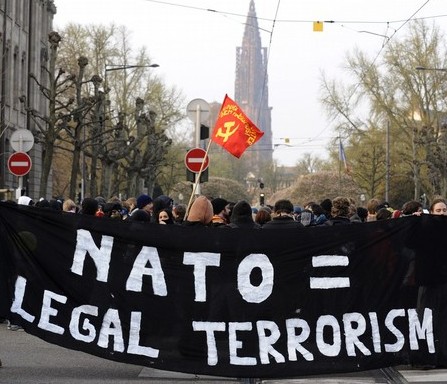 "Since the 1990s, NATO has
expanded its membership and
theatre of operations. NATO currently has 28 member states across
North America and Europe. Another 22 countries are engaged in the
Euro Atlantic Partnership Council (EAPC). A further 19 countries
are partnered with NATO through programs such as the so-called
'Partnership for Peace,' 'Mediterranean Dialogue,' the 'Istanbul
Cooperation Initiative' or the 'Partners across the Globe
Initiative.' "Since the 1990s, NATO has
expanded its membership and
theatre of operations. NATO currently has 28 member states across
North America and Europe. Another 22 countries are engaged in the
Euro Atlantic Partnership Council (EAPC). A further 19 countries
are partnered with NATO through programs such as the so-called
'Partnership for Peace,' 'Mediterranean Dialogue,' the 'Istanbul
Cooperation Initiative' or the 'Partners across the Globe
Initiative.'
"This expansion alone reveals NATO's fundamental
purpose: to
be a key tool of imperialist domination of the globe.
"Over the past two decades NATO and its affiliates have
attacked Yugoslavia (and its province Kosovo), Afghanistan, Iraq,
Libya, and Syria with the obvious goal of overthrowing these countries'
governments. In most of these cases the government was targeted by NATO
because it refused to accept the dictates of U.S. or EU foreign and
economic policy. In none of these cases has the goal or result been
democracy and peace -- the only legacy is death for the people,
destruction and displacement -- with increased power, control of
resources and profits for NATO states."
The WPC also points out how the U.S.-EU carried out
regime
change in Ukraine to use it as a cat's paw against Russia and
provide a pretext for NATO intervention, which has come in the
form of the largest build-up of hostile military forces on
Russia's western border since World War Two.
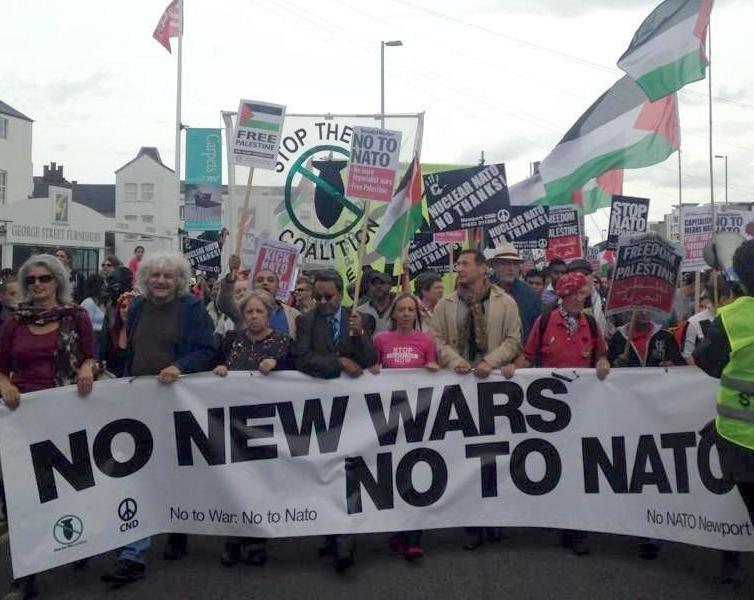 "NATO's actions, as the
favoured military tool of U.S.
and EU
imperialism, have led to an ongoing climate of confrontation between
the major nuclear-armed states. Such provocations lead inevitably
to escalating tensions and the real threat of a nuclear
confrontation and a generalized war that unavoidably would
destroy all civilization across the planet," the WPC states. "NATO's actions, as the
favoured military tool of U.S.
and EU
imperialism, have led to an ongoing climate of confrontation between
the major nuclear-armed states. Such provocations lead inevitably
to escalating tensions and the real threat of a nuclear
confrontation and a generalized war that unavoidably would
destroy all civilization across the planet," the WPC states.
Anti-war activists converging in Warsaw particularly
denounce the ways in which the Polish people's security is being
threatened by Poland's increasing involvement in NATO
aggression. They point out in a recent statement:
"The proposals of the present Polish government to
station
permanent NATO bases in Poland and build a new Missile Defence
Shield in the country would not guarantee the country's safety
but rather place it on the frontline of these new hostilities
[against Russia]. NATO is urging all member states to increase
their military spending to at least 2 per cent of GDP. Not only
will this intensify the arms race in the world, but it will mean
that during a time of economic austerity more funds will move
from welfare to war. When the governments and Generals meet in
Warsaw in July an alternative voice must be heard."
Actions to Oppose NATO
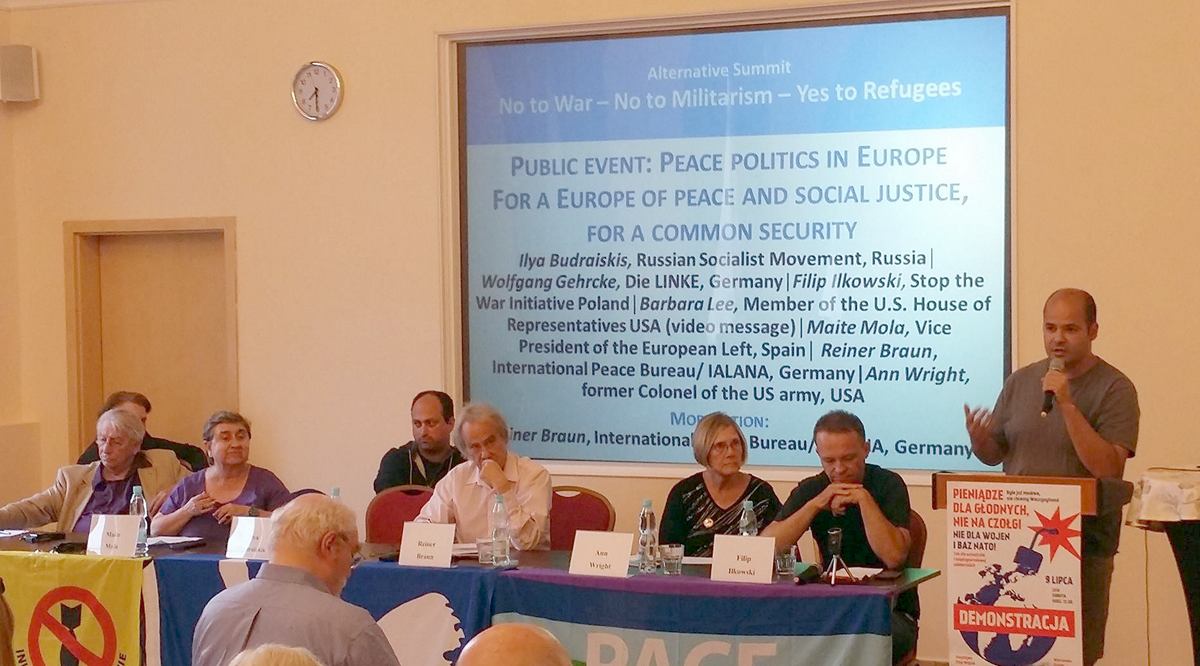
Anti-war activists hold counter summit in Warsaw, July 8, 2016.
The WPC has undertaken a campaign with numerous
European and
North American peace forces who also oppose NATO's aggressions
and existence. The "Yes to Peace! No to NATO! Campaign" calls for
the dissolution of NATO at a global level, supports the struggle
against NATO in each of its member states, and promotes the right
of the people in each country to unilaterally withdraw from the
NATO military alliance. In particular the WPC has been working
with its member organizations to mobilize the anti-war forces
against the Warsaw Summit.
From July 8 to 10 in Warsaw, anti-war activists from
Europe
and beyond say they will carry out the following:
 "- On Friday 8 July we
shall hold a conference bringing
together the organisations and activists of the peace and
anti-war movements. This will be an opportunity to discuss and
debate alternatives to the policies of militarisation and war
being proposed by NATO. In the evening we shall hold a large
public meeting. We already have a number of prominent speakers
(both international and from Poland) confirmed, including former
Colonel Ann Wright, Maite Mola, and Tarja Cronberg. "- On Friday 8 July we
shall hold a conference bringing
together the organisations and activists of the peace and
anti-war movements. This will be an opportunity to discuss and
debate alternatives to the policies of militarisation and war
being proposed by NATO. In the evening we shall hold a large
public meeting. We already have a number of prominent speakers
(both international and from Poland) confirmed, including former
Colonel Ann Wright, Maite Mola, and Tarja Cronberg.
"- On Saturday we will take our protest to the streets
of
Warsaw to express our opposition to the NATO summit.
"- On Saturday evening a cultural/social event will be
held.
[...]"
They state: "Our goal is a world without war and nuclear
weapons.
We are
fighting to overcome NATO through the politics of common security
and disarmament and solidarity with global peace, anti-war &
anti-militaristic movements."
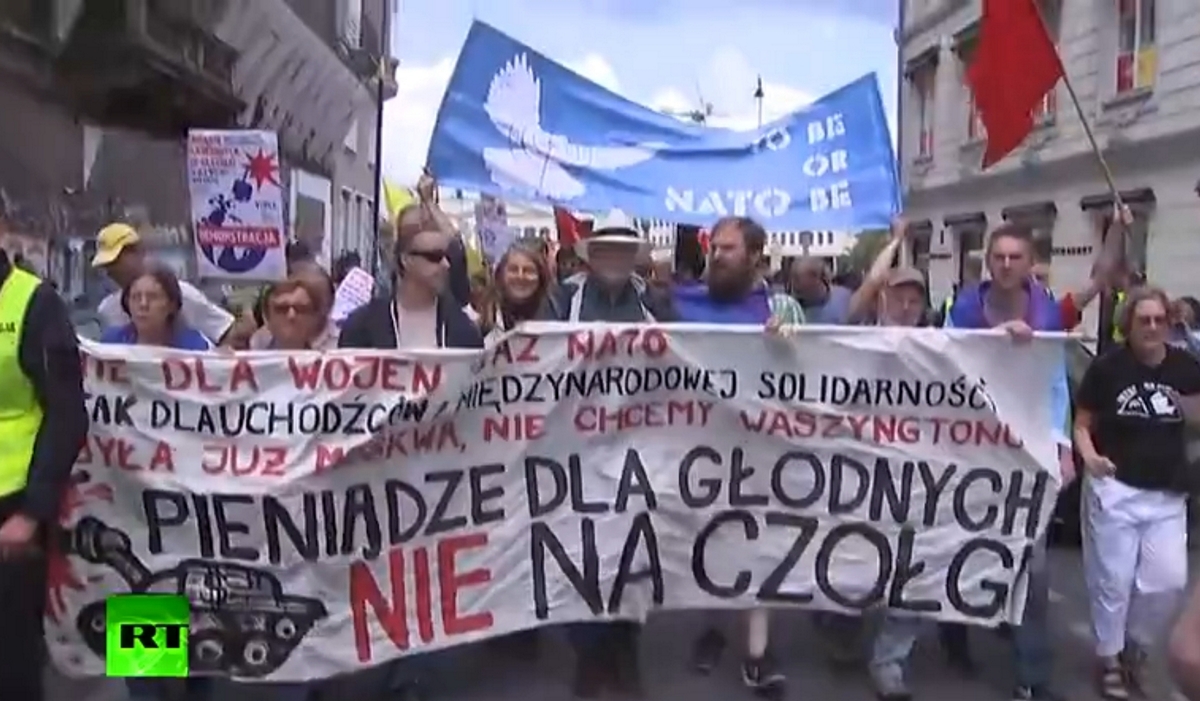
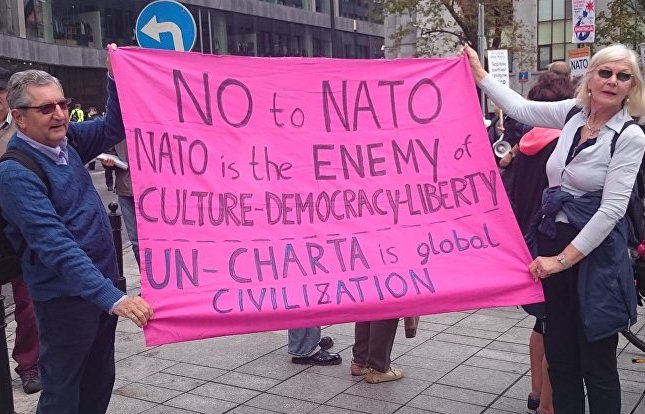 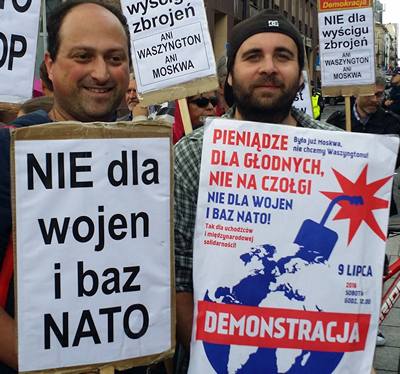
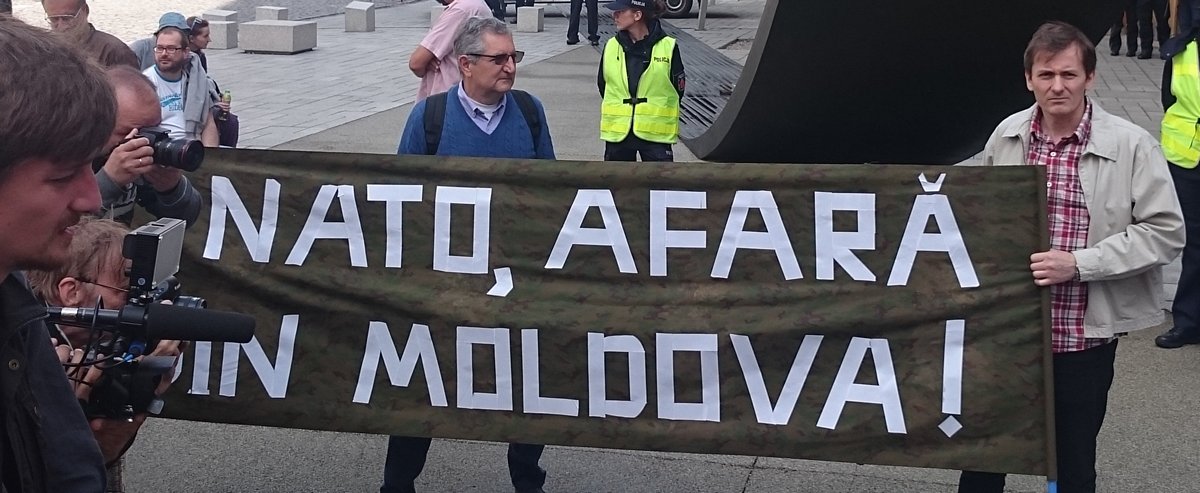
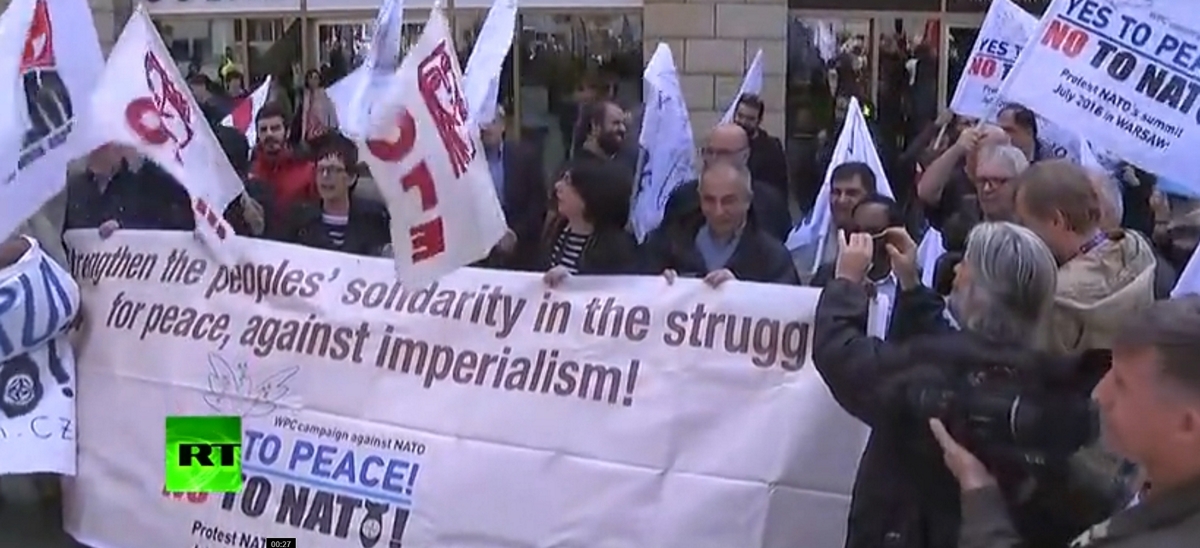
Anti-war march through Warsaw, July 9, 2016. Activists carry signs and
banners calling for money for arms to be spent on meeting human needs;
against any NATO weaponry and bases in Poland; against Moldova's
joining of NATO against its people's wishes; amongst many others.

No Canadian Troops in the Baltics and
Eastern Europe!
- Dougal MacDonald -
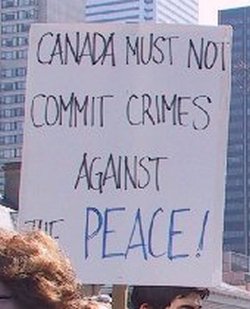 The Justin Trudeau Liberal
government announced on June 30 that Canada will send hundreds of
troops to join a "NATO high-readiness brigade" getting ready to deploy
in one of the Baltic states, later revealed to be Latvia. The exact
number of troops and their final location will be announced at the next
NATO conference. The Liberals are continuing the aggressive policies of
the Harper Conservative government, which sent troops to train in
Eastern
Europe in 2014 and 2015. Liberal Minister of Defence Harjit Sajjan
claims that the Canadian troops are required to help deter "Russian
aggression," even though no Russian troops have moved outside their own
borders. Sajjan also made it clear that the deployment has nothing to
do with defending the interests of the Canadian people but is being
made at the request of U.S.-led NATO. The Canadian troops will be one
of four battalions; the others are from the main imperialist powers:
the U.S., the U.K. and Germany. The Justin Trudeau Liberal
government announced on June 30 that Canada will send hundreds of
troops to join a "NATO high-readiness brigade" getting ready to deploy
in one of the Baltic states, later revealed to be Latvia. The exact
number of troops and their final location will be announced at the next
NATO conference. The Liberals are continuing the aggressive policies of
the Harper Conservative government, which sent troops to train in
Eastern
Europe in 2014 and 2015. Liberal Minister of Defence Harjit Sajjan
claims that the Canadian troops are required to help deter "Russian
aggression," even though no Russian troops have moved outside their own
borders. Sajjan also made it clear that the deployment has nothing to
do with defending the interests of the Canadian people but is being
made at the request of U.S.-led NATO. The Canadian troops will be one
of four battalions; the others are from the main imperialist powers:
the U.S., the U.K. and Germany.
The imperialists and their monopoly media claim that
the so-called proof of the need to deter Russian aggression is what
they misleadingly refer to as "Russia's annexation of Crimea" in 2014.
This is a deliberate distortion of the historical facts to try to
demonize Russia. On March 16, 2014, Crimea held a popular referendum in
which 83.1 per cent of Crimean voters freely cast their ballots on
whether to stay under the rule of Ukraine or secede and become an
independent state. The final tally was 96.77
per cent in favour of joining the Russian federation. The result was
not surprising. The major nationalities in Crimea are 58.32 per cent
Russian; 24.32 per cent Ukrainian; and 12.10 per cent Crimean Tartar.
It is this overwhelming popular vote to secede from rule by
Ukraine which the imperialists and their monopoly media are calling
"Russian annexation." Massive disinformation about this overwhelming
vote has been used to justify the damaging sanctions against Russia,
spearheaded by the U.S.
It is not surprising that the people of Crimea voted to
secede from Ukraine. In today's Ukraine, admitted Nazis hold
important positions in the government and seats in the
parliament, and command their own private armies. They are the
ones leading the murderous attacks on those who refuse to come
under the dictate of Ukraine. The seeds for this situation were
sown during the Second World War when the Nazi-funded criminal
groups Organization of Ukrainian Nationalists (OUN) and Ukrainian
Insurgent Army (UPA) posed as "patriots" in order to massacre
Russians, Poles and Jews. Further, in Latvia, where the Canadian
troops are likely to be located, as well as in the other Baltic
states, Nazis and neo-Nazis hold annual parades to commemorate
the war crimes of their wartime predecessors. All this
notwithstanding, the rulers of Ukraine and the Baltic states are
fully supported by Canada and the U.S., while Russia, which
annually introduces an anti-Nazi resolution at the United
Nations, is accused of aggression. It is noteworthy that each
time the anti-Nazi resolution has been introduced in recent
years, Canada, the U.S. and Ukraine have all voted against
it.
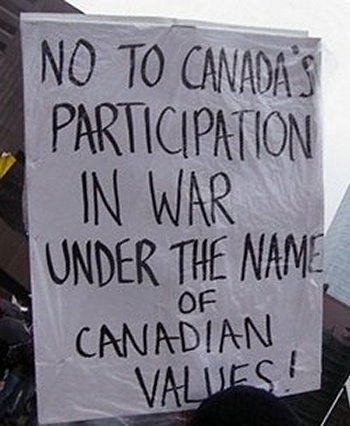 The hypocrisy of the U.S.
and its sycophants in the Liberal government is clear for all to see.
Echoed by the Trudeau government, the U.S. rants about Russian
aggression yet everyone knows that it is the U.S. which continually
launches aggression across the globe and which wants to dominate the
world. The U.S. routinely invades other countries, uses weapons of mass
destruction, kills civilians, assassinates even its own citizens,
organizes coups d'état, finances fascist and racist groups, and
commits other war crimes. It is not Russia that poses the most danger
to the world's people at this time and which needs to be deterred but
U.S.-led NATO. Flying in the face of all reason, the Liberal war
government is pushing for further integration into the U.S. war machine
precisely at a time when the U.S. ruling elite is organizing for a
Clinton presidency that will launch further aggression against the
world's people. The hypocrisy of the U.S.
and its sycophants in the Liberal government is clear for all to see.
Echoed by the Trudeau government, the U.S. rants about Russian
aggression yet everyone knows that it is the U.S. which continually
launches aggression across the globe and which wants to dominate the
world. The U.S. routinely invades other countries, uses weapons of mass
destruction, kills civilians, assassinates even its own citizens,
organizes coups d'état, finances fascist and racist groups, and
commits other war crimes. It is not Russia that poses the most danger
to the world's people at this time and which needs to be deterred but
U.S.-led NATO. Flying in the face of all reason, the Liberal war
government is pushing for further integration into the U.S. war machine
precisely at a time when the U.S. ruling elite is organizing for a
Clinton presidency that will launch further aggression against the
world's people.
The Trudeau government is playing a very dangerous game
in subverting the interests of the Canadian people to those of the
imperialist states and in cosying up to the Nazis in Ukraine and the
Baltic states. Sending troops to the Baltic states is clearly another
open provocation against Russia, which is not in the interests of the
Canadian people. The disinformation of some non-existent Russian
aggression is an attempt to sow confusion among the Canadian people,
and to smash their overwhelming opposition to warmongering. The way
forward is clear. The security of the Canadian people lies not in
further tying Canada to the U.S., NATO and the imperialist states but
in standing as one with the world's peoples in defence of their right
to be against U.S. imperialist preparations for another world war.
Canada should not send any troops to the Baltics or Eastern Europe and
should withdraw any that are already there. Now, more than ever, Canada
needs an anti-war government.

Map of notable military bases in the Baltics, where Canada may
establish its troops
-- click to enlarge.

For Your
Information
Overview of NATO War Summit
A NATO Leaders' Summit is being held July 8-9 in
Warsaw,
Poland with the Heads of State and Government of NATO's 28 member
countries among others in attendance. The Summit is being
attended by 58 official delegations from 26 "partner countries"
and representatives from the United Nations, the European Union,
the World Bank and the NATO Parliamentary Assembly as well as
NATO members. It is being chaired by the organization's Secretary
General, Jens Stoltenberg. Canadian Prime Minister Justin Trudeau
is at the Summit along with Minister of Foreign Affairs Stephane
Dion, Minister of Defence Harjit Sajjan and Chief of the Defence
Staff, General Jonathan Vance.
The Summit will add to actions taken since the last
Summit
held in Wales in 2014 to mobilize more NATO troops and military
equipment to the countries of Central and Eastern Europe and the Baltic
states under
the bogus pretexts of "projecting stability" in the region and
"deterring Russian aggression."
Protest Actions
Demonstrations are taking place in Warsaw from July
8-10
under the banner "No to War -- No to NATO." Organizers are
calling for an end to the confrontation with Russia and the
stationing of troops and holding of maneuvers at Russia's western
border; no further armament in the NATO member states which they
say can only be financed by sharply reducing spending on
education, health care and social security systems; no new
nuclear weapons (and no modernization of existing arsenals) in
Europe and worldwide; no missile defense system in Eastern Europe
as it only furthers the dynamic of armament and confrontation;
and no NATO operations against refugees.
It is reported that on July 4 increased border controls
were
imposed by Poland at its border with Russia near Kaliningrad, its
borders with Ukraine and at its borders with the countries of the
EU Schengen Zone for the NATO Summit -- no doubt aimed at keeping
out those intent on protesting NATO.
Troop Build-Up in Baltic States and Eastern Europe to
Be Finalized
Speaking at a press conference on July 4, Stoltenberg
said
that since the last Summit NATO had "delivered a faster, a
stronger, and a more ready Alliance," and that "We now need to
take the next steps. So at our Summit in Warsaw, we will agree to
further enhance our military presence in the eastern part of the
Alliance." In this vein, he said leaders will agree at the Summit
to deploy four battalions to Estonia, Latvia, Lithuania and
Poland. On July 8 U.S. President Barack Obama announced that the
U.S. will station a battalion of 1,000 troops in Poland and
establish the headquarters for a separate brigade of 3,500 U.S.
troops and heavy weaponry that will move throughout Eastern
Europe on continuous, nine-month rotations. Also on July 8,
General Vance revealed that Canada would be sending around 450
soldiers to Latvia "on an enduring basis" to form the nucleus of
a 1,000-strong multinational battalion it will lead there. Canada
will also send up to six CF-18s to carry out "air policing" over
Eastern Europe as it had done in 2014-15 and will continue
sending naval frigates to the region as part of its Operation
REASSURANCE. Germany and Britain are expected to command the
other two battalions in Lithuania and Estonia, respectively.

Click to enlarge.
Canada's Battlegroup
Canada's commitment of hundreds of new troops for a
battlegroup means the total number of Canadian Forces members from all
three branches stationed in the Baltics and Eastern Europe with
Operation REASSURANCE will rise to around 800, reports say. In a July
update the Department of National Defence said there were 470 Canadian
Forces members deployed in its Baltics and Eastern European operations.
Since it began in April 2014 Operation REASSURANCE has involved the
participation of Canadian troops in ongoing land exercises with other
NATO members in Poland, Latvia, Romania, Germany and Lithuania;
Canadian fighter jets in interoperability training and "air policing"
of the Baltic region; and Canadian warships in patrolling and carrying
out other NATO operations in the Baltic, Black, Mediterranean and
Aegean Seas.
Minister Sajjan confirmed Canada's new troop presence
in the
Baltic region with rotating deployments would be on a permanent
basis, understood to mean until such time as NATO dissolved the
task force. A June 30 report by the CBC noted that a battlegroup
has the potential to bring with it heavy equipment, including
tanks, artillery and surveillance systems.
In announcing on June 30 that Canada would be sending
more
troops and taking command of a battalion, Defence Minister Harjit
Sajjan said, "As part of NATO we were giving assurance to member
states there, but now this has evolved to deterrence." His
assertion is based on the fraudulent notion that Russia is
threatening to invade other countries, while it is the U.S. and
NATO that have bases and missile systems all over Europe and that
threaten and invade other countries with impunity. The Canadian
troops along with those from other major NATO powers are a
deliberate form of political and military interference intended
to keep the peoples of the countries bordering Russia firmly in
NATO's grip to try and suppress any aspirations they may have for
friendly relations with non-NATO countries to the east and
against war.
NATO's "Southern Flank"
The Summit is also expected to take decisions on a new
military force on NATO's "south-east flank" said to refer to a
task force based in Romania and will also "adopt a framework for
NATO's further adaptation to the challenges emanating from the
south." The U.S. already has its Ashore Aegis ballistic missile
system installed at Deveselu in southern Romania, claiming it
poses no threat to Russia but targets threats from the south such
as Iran.
In response to the fact that NATO is aggressively
militarizing Eastern Europe and the Baltics, particularly those
countries on Russia's borders, Stoltenberg said, "We don't want a new
Cold War. What we do is proportionate. It's defensive." The whole talk
about defence and deterrence is meant to hide the virtual occupation of
Eastern Europe and its peoples by NATO forces, in which Canada is now
even more embroiled under the Trudeau government.
Since the last Leaders' Summit in Wales in 2014, NATO
has
tripled the size of its Response Force, intended to assemble and
respond within a week to 10 days, to 40,000 members. It has also
added a Very High Readiness Joint Task Force or Spearhead Force
that is supposed to be able to deploy within 48 hours to NATO's
eastern and southern flanks. After this Summit there will also be
a new "high readiness brigade" of 4,000 troops comprised of the
four battalions to be stationed in the Baltic states and
Poland.
In presenting what is being put in place for the
future, a
news release on the Summit points out moves to strengthen NATO's
domination of its "partners" in Eastern Europe, in particular
Ukraine, Georgia and the Republic of Moldova, as well as Finland
and Sweden: "To the east, NATO will continue to boost the defence
capabilities and build the resilience of its partners Ukraine,
Georgia and the Republic of Moldova to resist outside pressure
and to advance reforms."
The release goes on to say that "NATO will continue to
work
closely with partners such as Finland, Sweden and Georgia, who
have a significant contribution to make to security in the
strategically important Baltic Sea and Black Sea regions.
Montenegro's future membership will enhance stability in the
Western Balkans. NATO's Open Door Policy, together with EU
enlargement, have helped to spread stability and prosperity.
NATO's door remains open to European states able to undertake the
commitments and obligations of membership, and contribute to
security in the Euro-Atlantic area."
War in Iraq and Syria
NATO is also increasing its participation in the
U.S.-led war in Iraq and Syria. The Summit is expected to approve the
deployment of NATO AWACS surveillance planes in support of the U.S.-led
"global coalition to counter ISIL." It is possible that Canada will
provide such planes as the Canadian government has indicated that in
addition to sending troops to Russia's borders it will make other
announcements at the summit. Stoltenberg also said he expected NATO
members would agree on a new "training and capacity building" effort in
Iraq, of which Canada is part. NATO is currently training several
hundred Iraqi officers in Jordan, and is "strengthening" the defence
sectors of Jordan and Tunisia. In an indication that it is preparing
for a new direct military role in Libya it states that it "also
continues its preparatory work to assist Libya, if requested."
NATO is also expanding its role in militarizing
humanitarian crises which it has itself created. It will look to take
on a role in the Central Mediterranean as part of the European Union's
Operation Sophia. Operation Sophia was set up in July 2015 to "stem the
flow of migrants and refugees" from Libya after NATO-backed mercenaries
and war planes destroyed the country and its institutions and killed
its President. It is reported that one of the problems facing the
mission is the lack of a legitimate government in Libya from which EU
forces can get agreement to patrol its maritime borders and even its
coast. NATO also indicates that its deployment in the Aegean Sea to
deal militarily with the humanitarian refugee and migrant crisis
"caused by conflict and instability on NATO's southern borders" will
continue.
Emphasis on Increased Military Spending from Members
NATO also indicated that for the first time in many
years
there had been a small increase in defence spending among
European Allies and Canada and that it expects military spending
to rise further in these countries in 2016. During the federal
election, the Trudeau Liberals committed to maintain defence
spending at current levels, which it indicated meant maintaining
the budgeted increases.
Official Summit Agenda
July 8, the opening day, featured a meeting of the
North
Atlantic Council attended by leaders of the 28 member states and
of Montenegro which has observer status. This was followed by a
working dinner to which Finland, Sweden, the European Council and
the European Commission were invited to join the leaders of NATO
member states.
On July 9 there will be a meeting on Afghanistan with
Afghan
President Ashraf Ghani and Chief Executive Abdullah
participating, along with representatives of "partner countries
contributing to the NATO-led Resolute Support Mission" and
unspecified international organizations in attendance. There will
also be a second meeting of the North Atlantic Council to which
Jordan, the European Council and the European Commission have
been invited. The Summit will end with a NATO-Ukraine Commission
meeting with the President of Ukraine.
NATO Defence and Foreign Ministers will be joined at
the
summit by their counterparts from "partner countries" and hold
parallel meetings. One such meeting will see NATO Defence
Ministers meeting with their counterparts from 25 countries which
"cooperate with NATO on interoperability," including Armenia,
Australia, Austria, Azerbaijan, Bahrain, Bosnia and Herzegovina,
Finland, Georgia, Ireland, Japan, Jordan, Kazakhstan, Republic of
Korea, Republic of Moldova, Mongolia, Montenegro, Morocco, New
Zealand, Serbia, Sweden, Switzerland, the former Yugoslav
Republic of Macedonia, Tunisia, Ukraine, and the United Arab
Emirates.

Third Anniversary of Lac-Mégantic
Tragedy
Build a Public Authority that Defends the
Public Interest,
Not Private Monopoly Interest!
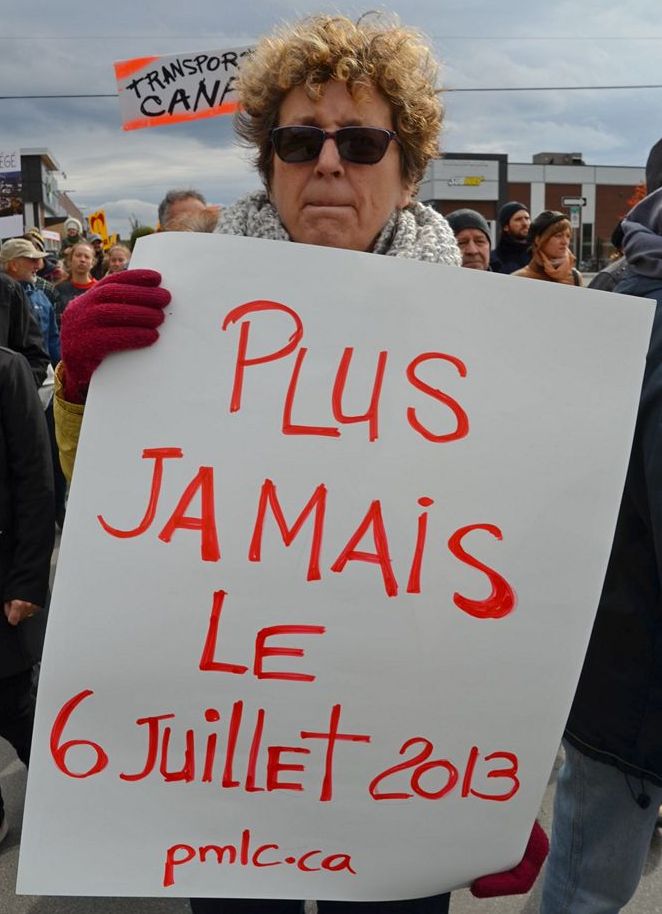
July 6, 2016 is the third anniversary of the
Lac-Mégantic tragedy, one of the worst train disasters in
Canadian history. On July 10, the Mégantic community is holding
a mass rally to mark this date and reiterate their demands for the
immediate construction of a bypass track so that dangerous goods are
not transported through the town centre and for the significant repairs
required to the worn-out track. TML
Weekly supports these demands and calls on people to participate
in the rally and defend Lac-Mégantic and the other rail
communities affected by train derailments, which continue to occur
regularly across Quebec, Canada and the United States.
Three years ago, in late evening on July 5, a freight
train
comprised of five locomotives and 72 tanker cars that were
unsuited for the type of crude oil they carried was left
unattended for the night in Nantes, in Quebec's Eastern
Townships. At around 1:00 am on July 6, the train started to roll
down the slope towards the town of Lac-Mégantic. Shortly after,
63 of the tanker cars derailed in downtown Lac-Mégantic,
spilling
their contents and causing a series of fires and explosions of
catastrophic proportion. Forty-seven people were killed and many
others were injured. Downtown Lac-Mégantic was destroyed. The
Chaudière River and the lake itself were heavily contaminated by
the crude oil spill. To this day, many Lac-Mégantic residents
suffer from post-traumatic stress related to the tragedy.
A large number of trains carrying crude oil have
derailed
since the Lac-Mégantic tragedy, including in Casselton, North
Dakota in December 2013; near Plaster Rock, New Brunswick in
January 2014; and in Gogama, Northern Ontario in March 2015. They
were all potential Lac-Mégantic tragedies, with loss of life
avoided only because the derailments happened a few kilometres
away from a densely populated area.
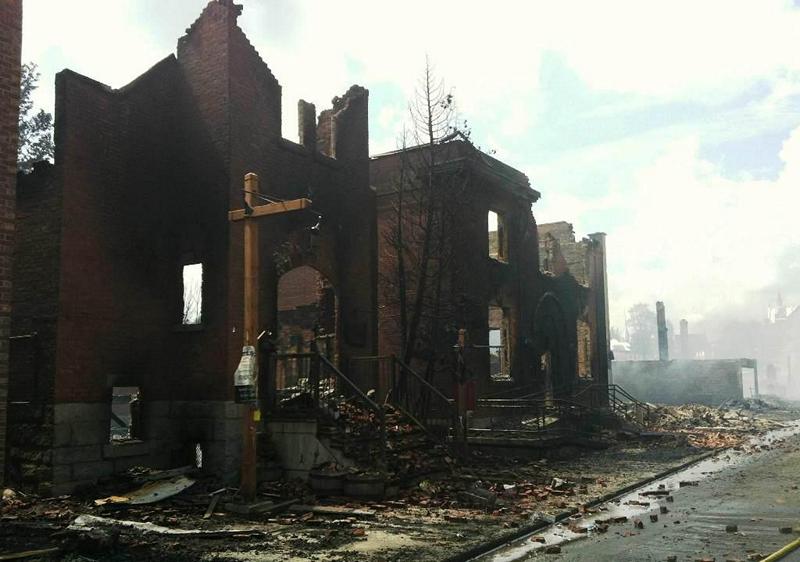 The fact is that three years
after the Mégantic tragedy, the
dangers to human life, property and the environment are even more
acute due to the criminal negligence of the railway monopolies.
They claim their overriding responsibility and most urgent task
is to be competitive with other carriers nationally and
internationally at any cost, and the government irresponsibly refuses
to hold them to account. The fact is that three years
after the Mégantic tragedy, the
dangers to human life, property and the environment are even more
acute due to the criminal negligence of the railway monopolies.
They claim their overriding responsibility and most urgent task
is to be competitive with other carriers nationally and
internationally at any cost, and the government irresponsibly refuses
to hold them to account.
Lac-Mégantic was a tragic and profound
eye-opener as to how the
neo-liberal outlook and practice of putting all of society's
assets at the disposal of the global monopolies that directly led
to the self-regulation of the railways and to criminal negligence
causing death and chaos. A radical break with the neo-liberal
anti-social agenda is required to favour the people along with
immediate measures to enforce safety according to highest
standards in terms of working conditions, required personnel,
maintenance and all other relevant aspects. The demand is for a
public authority over which people exercise control that protects
the safety of the rail communities and the public at large by
upholding the public interest and not private monopoly
interest.
In light of this, the statement issued by Prime
Minister
Justin Trudeau on the occasion of the third anniversary of the
Lac-Mégantic tragedy was most inappropriate and uncouth. The
statement said, in part:
"Rail safety remains a top priority for the Government
of
Canada, and we will continue to take steps to improve the safety
of the Canadian rail system. The Minister of Transport, Marc
Garneau, visited Lac-Mégantic in April to hear from those most
directly affected by the tragedy. [...]
"To the people of Lac-Mégantic, please know that
you have our
steadfast support as you continue to recover and heal. We
remember you and all that you lost, and will use this memory to
strengthen our resolve to make our railroads the safest in the
world, and ensure the tragic events of Lac-Mégantic never happen
again."
What does the Prime Minister mean by "we will continue
to
take steps to improve the safety of the Canadian rail system"?
"Continuation" is the watchword of governments that are waging
the anti-social offensive and who refuse to address the real
problems that the people are facing — both the cause and the
solution -- and instead take refuge in mantras and phrases. It is
one way to avoid taking responsibility for one's own actions and
the impact they have in the creation of these problems. The
movement is demanding a break with what caused the Lac-Mégantic
tragedy, not its continuation.
The Prime Minister is positioning himself and his
government
to drown all the demands of the people in a swamp of policy
objectives, statements of good intentions, feasibility studies
and consultations in order to actually maintain the status quo.
This statement, which was issued on such a solemn day, must be
firmly condemned and rejected.
Once again, TML Weekly sends its deepest
condolences
to all who lost loved ones in the tragedy and pays tribute to all
the first responders who risked their lives to heroically come to
the aid of residents and who continue to provide all possible
assistance to the community. TML Weekly warmly salutes the
Lac-Mégantic community who continue to rebuild their lives and
calls upon workers and people to step up their fight for the
building of a public authority that protects the safety of
communities and of the public.

Mass Rally in Lac-Mégantic for Rail Safety

Sunday, July 10 --
1:30 pm
Parking
Lot,
Mégantic
Sports
Centre
5400
Papineau
St.
Facebook
When Will Lac-Mégantic Have
Rail Safety, Mr.
Trudeau?
Program:
- Reading of Declaration to Justin Trudeau
- Speeches
-
Symbolic occupation of the rail line -- stuffed animals to be
laid in tribute to children left orphaned by the tragedy (bring stuffed
animals)
-
Discussion at the Musi-Café (where most of the victims of
the tragedy died)

Interviews
New Rail Line Bypassing Town Centre Needed Soon
- Robert Bellefleur, Spokesperson,
Coalition
of Citizens and Groups for Rail Safety -
Nothing has changed on the ground since 2013 as far as
rail safety is concerned, in Lac-Mégantic and in Canada. The new
Liberal government is still pursuing deregulation and the principle of
the self-management of rail safety by the companies themselves. We had
another example a couple of weeks ago with the decision of CP Rail to
lay off 500 workers doing track inspection and maintenance, and yet the
Minister of Transport Marc Garneau says that everything is fine. He
came to Lac-Mégantic and shared the podium with the President of
the Central Maine & Quebec Railway (CMQR) to try to reassure the
people that the tracks have been inspected and that they are in good
shape and safe. We do not believe that they are safe, especially on the
curves where they are extremely worn. On steep parts of the line, where
there are culverts, there are deep cracks in the cement structure. When
we see a spot where the rail line is in bad shape, often the rail
company merely reduces the speed of the train instead of doing the
needed repair.
|

"We want to heal in peace --
reconstruct without the track!"
|
Here in
Lac-Mégantic, the transportation of dangerous
goods via the town centre -- propane gas, fuel, chlorine and sulphuric
acid -- has restarted. At the moment, there
is an agreement with CMQR that the transportation of crude oil
via the town centre is suspended but the agreement expires at the
end of the year. This does not bode well for 2017. So we are
basically facing the same dangers as in 2013.
Meanwhile, the siding track at Nantes on which trains
can be parked safely when they are having mechanical problems is
still being used to park railcars waiting to be assembled with
locomotives that are left without surveillance for days and days. That
is
how the Mégantic tragedy began: the train that was
having mechanical problems was parked for the night on the main
track at Nantes rather than on the siding track and then started
moving down the slope and derailed. This could happen again
because the siding track is clogged.
On July 10, we are holding a public rally on the
occasion of
the third anniversary of the tragedy. We are asking Prime
Minister Trudeau to come to Mégantic to announce that a
new rail line that bypasses the town centre is going to be built
soon. They have tabled their feasibility report, according to
which, with all the steps that need to be taken, the construction
of the line would not start before 2021 or even 2022. The
Mégantic residents are still suffering from high anxiety
and post-traumatic stress. We cannot afford to wait another
five or six years before the construction begins.

Workers Still Under Framework Where Railways
Create and Enforce Their Own Rules
- Brian Stevens, Unifor National Rail
Director -
The Lac-Mégantic tragedy is one of the clearest
examples
of what happens when bureaucracy turns away from doing the right
thing. The government, the Transportation Safety Board (TSB),
Transport Canada (TC) and the industry themselves are not taking
any valid steps, notwithstanding all the rhetoric that we hear
out there. We continue to have runaway trains, we continue to
have the DOT 111 in service and bursting and causing chaos.[1] It
does not always have to be an explosion, just a spill into a
river or into a community is very significant. We are still not
dealing with the real issues that are required to ensure that the
public has confidence that the regulator and the industry are
operating railways in a safe manner.
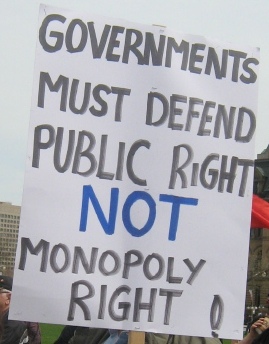 We do not have a regulatory
framework that can be enforced by
a regulator. We have a framework of rules that are created by the
railways and that are enforced by the railways and Transport
Canada, with significant lobbying from the railways, are only
observers and auditors. They do not play the same role that
inspectors do in the aviation industry or the road transport
industry. We would not allow the aviation industry to deal with
their own planes but we allow the railways to deal with their own
trains. The railways continue to operate like they are larger
than government themselves. We do not have a regulatory
framework that can be enforced by
a regulator. We have a framework of rules that are created by the
railways and that are enforced by the railways and Transport
Canada, with significant lobbying from the railways, are only
observers and auditors. They do not play the same role that
inspectors do in the aviation industry or the road transport
industry. We would not allow the aviation industry to deal with
their own planes but we allow the railways to deal with their own
trains. The railways continue to operate like they are larger
than government themselves.
As far as the new federal government is concerned, the
fact
is that the Minister's Advisory Council on Rail Safety has not
met since Marc Garneau was announced as Minister. Marc Garneau
has met often, we are told, with the railways and with the lobby
groups, but he has not met with the Advisory Council on Rail
Safety. We just had another meeting that was supposed to occur
last week postponed again until September. They talk differently
but we have not seen any willingness to sit down with industry
stakeholders and have meetings. So you take into consideration
all of the rail safety priority speak that this government talks
about and the very Council that was assembled to deal with and
discuss issues of rail safety has yet to meet with this
government.
In our work as an organization, we are expressing to
Transport Canada and the federal government that there is a role
for Transport Canada to play an active intervention role, not
just be some oversight auditor, to ensure that the railways are
operated in a safe manner. We do it by taking information and the
concrete circumstances directly toTransport Canada and raising
the issues with them. On the shop floor, we encourage our members
to report instances where there are problems and to have them
addressed and fixed, and if they are not we are working to make
sure that we have a mechanism internally where we raise those
things.
Note
1. The DOT 111
standard is considered inadequate for the transport of
flammable
goods. This is the class of tank cars that derailed in
Lac-Mégantic and 59 of the 63 cars ruptured and released their
contents.

Massive Layoff of CP Maintenance Workers
Jeopardizes Rail Lines and Public Safety
- Wade Phillips, Director, Eastern
Region,
Teamsters Canada Rail Conference, Maintenance of Way Employees
Division -
TML Weekly: At the end of
June, Canadian
Pacific railway (CP) announced a massive layoff of track
maintenance workers. How many workers are affected and what job
are they doing?
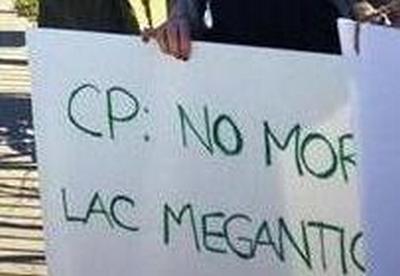 WP: CP announced that they will be
laying off approximately 260 of our members in addition to about 240
positions that they are choosing not to fill at this time. That is 500
positions that are being affected. These workers do everything from
basic track maintenance to everyday, run-of-the mill inspections and
repairs. They are workers involved in what we call the track programs
work, which is the track renewal, ties, rails, ballasts, new switches
installed, and so on -- a very wide range of work. We also have
instructor members who look after the care and repair as well as the
inspections of bridges and structures across the system. Those are
amongst the most important jobs on the railway. WP: CP announced that they will be
laying off approximately 260 of our members in addition to about 240
positions that they are choosing not to fill at this time. That is 500
positions that are being affected. These workers do everything from
basic track maintenance to everyday, run-of-the mill inspections and
repairs. They are workers involved in what we call the track programs
work, which is the track renewal, ties, rails, ballasts, new switches
installed, and so on -- a very wide range of work. We also have
instructor members who look after the care and repair as well as the
inspections of bridges and structures across the system. Those are
amongst the most important jobs on the railway.
We feel that these positions are integral to track
safety and
public safety as well. Situations like Lac-Mégantic certainly
bring out just what the possibilities are
for such disasters. The disaster was not track-related in that
case but there is the derailment of CN oil tankers near Gogama in
2015 that turned out to be track-related. That caused huge
devastation in Northern Ontario.
We are working to have these positions at least looked at from the
standpoint of the new government regulations that came into force in
2015 that require a risk assessment be done if there is to be a
reduction of the workforce.
CP's position now of laying off track maintenance
workers while there are lower car volumes is very short-sighted. This
is the time when they should be going all out to get the work done so
that when the track volumes rise, this work has already been done. When
the traffic is down, that is when our workers can get out there and get
the work done because there are no trains to work around.
Since Hunter Harrison took over CP in 2012, thousands of jobs have been
eliminated. We are not looking at a company that is doing poorly
financially. They are paying out more money to their shareholders as
they cut the work that needs to be done.
TMLW: Do you want to say anything
in
conclusion?
WP: The men and women who
are out there working on the tracks, working long hours, night shifts,
around the clock, in all kinds of weather, they do it with a great deal
of pride. They do it knowing that their jobs are important and have the
potential to protect the general public in Canada because of the work
they do and we certainly think they should be out there doing that work.
Cars are going through yards on a daily basis and I
believe that if you look at the Transport Canada statistics about 80
per cent of all derailments happen in yards now, and there are
huge populations in these areas. If these yards are not properly looked
after, there is that much more potential for derailments and possible
disasters.

Monopolies' Plans for Cameras to Monitor
Train Crews Threaten Privacy and Safety
- Don Ashley, National Legislative
Director,
Teamsters Canada Rail Conference -
TML Weekly: The Teamsters Canada
Rail
Conference (TCRC) has reported that the railway companies want to
use voice and video recordings to monitor the train crews. Can
you tell us more?
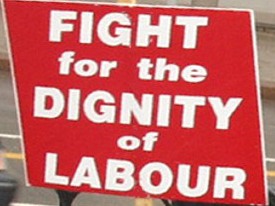 Don Ashley:
The issue of Locomotive Voice
and Video Recording technology has been hanging around for
several years. The Transportation Safety Board (TSB) has made
recommendations following a few accidents. In particular it was
highlighted after the Via Rail accident in Aldershot in 2012 [Aldershot is a
neighbourhood of Burlington, Ontario -- TML
Ed. Note] where the TSB requested that they would like on-board
recordings of the cab of a locomotive so that they can determine human
factors with regards to accidents' causes. The employers,
all of them, CP, CN, Via and everybody that is going to be
affected by any change in regulations have said, "if you are
going to put it in, if you want us to put it in, we want access
to the data." The law has to be changed for them to have access
to recordings for pro-active safety use, meaning they want to
monitor the crews. Currently the Canadian Transportation
Accident Investigation and Safety Board Act (CTAISB) says
any on-board recordings are privileged only for the TSB to use
post-accident. Don Ashley:
The issue of Locomotive Voice
and Video Recording technology has been hanging around for
several years. The Transportation Safety Board (TSB) has made
recommendations following a few accidents. In particular it was
highlighted after the Via Rail accident in Aldershot in 2012 [Aldershot is a
neighbourhood of Burlington, Ontario -- TML
Ed. Note] where the TSB requested that they would like on-board
recordings of the cab of a locomotive so that they can determine human
factors with regards to accidents' causes. The employers,
all of them, CP, CN, Via and everybody that is going to be
affected by any change in regulations have said, "if you are
going to put it in, if you want us to put it in, we want access
to the data." The law has to be changed for them to have access
to recordings for pro-active safety use, meaning they want to
monitor the crews. Currently the Canadian Transportation
Accident Investigation and Safety Board Act (CTAISB) says
any on-board recordings are privileged only for the TSB to use
post-accident.
We have been lobbying the government to say that our
opinion,
from the union perspective, is that we have no issue with them
having the recording devices on the locomotives but that
information is privileged and should only be accessible by the
TSB post-accident. It is not for continuous monitoring by the
employer of the crews' activities. We feel first that this is a
privacy invasion and secondly it could be a distraction to the
crews actually performing their duties. It would create what we
call a silent cab environment where the crew won't talk to each
other for fear anything they say may be used against them, so the
communication amongst the crew members and the cab will become
very limited which will have a negative impact on safety.
The fear we have is that the TSB and Transport Canada
want
access to this data so badly that they are willing to give in to
the carriers. We have been lobbying hard not to have that happen. The
Standing Committee on Transport, Infrastructure and Communities
has just wrapped up their update on rail safety and they tabled
their report to Parliament on June 16. They recommended that
Transport Canada develop legislation and regulatory structures to
mandate the use of locomotive voice and video recorders but to
ensure that effective rules are in place that it is only for the
exclusive use of TSB for accident investigations, which is what
we want.
Our position is that we are going to fight this all the
way.
If we fail with the government and the regulatory agencies, our next
step
will be the Privacy Commissioner.

PREVIOUS
ISSUES | HOME
Website: www.cpcml.ca
Email: editor@cpcml.ca
|

 "Since the 1990s, NATO has
expanded its membership and
theatre of operations. NATO currently has 28 member states across
North America and Europe. Another 22 countries are engaged in the
Euro Atlantic Partnership Council (EAPC). A further 19 countries
are partnered with NATO through programs such as the so-called
'Partnership for Peace,' 'Mediterranean Dialogue,' the 'Istanbul
Cooperation Initiative' or the 'Partners across the Globe
Initiative.'
"Since the 1990s, NATO has
expanded its membership and
theatre of operations. NATO currently has 28 member states across
North America and Europe. Another 22 countries are engaged in the
Euro Atlantic Partnership Council (EAPC). A further 19 countries
are partnered with NATO through programs such as the so-called
'Partnership for Peace,' 'Mediterranean Dialogue,' the 'Istanbul
Cooperation Initiative' or the 'Partners across the Globe
Initiative.' "NATO's actions, as the
favoured military tool of U.S.
and EU
imperialism, have led to an ongoing climate of confrontation between
the major nuclear-armed states. Such provocations lead inevitably
to escalating tensions and the real threat of a nuclear
confrontation and a generalized war that unavoidably would
destroy all civilization across the planet," the WPC states.
"NATO's actions, as the
favoured military tool of U.S.
and EU
imperialism, have led to an ongoing climate of confrontation between
the major nuclear-armed states. Such provocations lead inevitably
to escalating tensions and the real threat of a nuclear
confrontation and a generalized war that unavoidably would
destroy all civilization across the planet," the WPC states.
 "- On Friday 8 July we
shall hold a conference bringing
together the organisations and activists of the peace and
anti-war movements. This will be an opportunity to discuss and
debate alternatives to the policies of militarisation and war
being proposed by NATO. In the evening we shall hold a large
public meeting. We already have a number of prominent speakers
(both international and from Poland) confirmed, including former
Colonel Ann Wright, Maite Mola, and Tarja Cronberg.
"- On Friday 8 July we
shall hold a conference bringing
together the organisations and activists of the peace and
anti-war movements. This will be an opportunity to discuss and
debate alternatives to the policies of militarisation and war
being proposed by NATO. In the evening we shall hold a large
public meeting. We already have a number of prominent speakers
(both international and from Poland) confirmed, including former
Colonel Ann Wright, Maite Mola, and Tarja Cronberg.




 The Justin Trudeau Liberal
government announced on June 30 that Canada will send hundreds of
troops to join a "NATO high-readiness brigade" getting ready to deploy
in one of the Baltic states, later revealed to be Latvia. The exact
number of troops and their final location will be announced at the next
NATO conference. The Liberals are continuing the aggressive policies of
the Harper Conservative government, which sent troops to train in
Eastern
Europe in 2014 and 2015. Liberal Minister of Defence Harjit Sajjan
claims that the Canadian troops are required to help deter "Russian
aggression," even though no Russian troops have moved outside their own
borders. Sajjan also made it clear that the deployment has nothing to
do with defending the interests of the Canadian people but is being
made at the request of U.S.-led NATO. The Canadian troops will be one
of four battalions; the others are from the main imperialist powers:
the U.S., the U.K. and Germany.
The Justin Trudeau Liberal
government announced on June 30 that Canada will send hundreds of
troops to join a "NATO high-readiness brigade" getting ready to deploy
in one of the Baltic states, later revealed to be Latvia. The exact
number of troops and their final location will be announced at the next
NATO conference. The Liberals are continuing the aggressive policies of
the Harper Conservative government, which sent troops to train in
Eastern
Europe in 2014 and 2015. Liberal Minister of Defence Harjit Sajjan
claims that the Canadian troops are required to help deter "Russian
aggression," even though no Russian troops have moved outside their own
borders. Sajjan also made it clear that the deployment has nothing to
do with defending the interests of the Canadian people but is being
made at the request of U.S.-led NATO. The Canadian troops will be one
of four battalions; the others are from the main imperialist powers:
the U.S., the U.K. and Germany. The hypocrisy of the U.S.
and its sycophants in the Liberal government is clear for all to see.
Echoed by the Trudeau government, the U.S. rants about Russian
aggression yet everyone knows that it is the U.S. which continually
launches aggression across the globe and which wants to dominate the
world. The U.S. routinely invades other countries, uses weapons of mass
destruction, kills civilians, assassinates even its own citizens,
organizes coups d'état, finances fascist and racist groups, and
commits other war crimes. It is not Russia that poses the most danger
to the world's people at this time and which needs to be deterred but
U.S.-led NATO. Flying in the face of all reason, the Liberal war
government is pushing for further integration into the U.S. war machine
precisely at a time when the U.S. ruling elite is organizing for a
Clinton presidency that will launch further aggression against the
world's people.
The hypocrisy of the U.S.
and its sycophants in the Liberal government is clear for all to see.
Echoed by the Trudeau government, the U.S. rants about Russian
aggression yet everyone knows that it is the U.S. which continually
launches aggression across the globe and which wants to dominate the
world. The U.S. routinely invades other countries, uses weapons of mass
destruction, kills civilians, assassinates even its own citizens,
organizes coups d'état, finances fascist and racist groups, and
commits other war crimes. It is not Russia that poses the most danger
to the world's people at this time and which needs to be deterred but
U.S.-led NATO. Flying in the face of all reason, the Liberal war
government is pushing for further integration into the U.S. war machine
precisely at a time when the U.S. ruling elite is organizing for a
Clinton presidency that will launch further aggression against the
world's people.

 The fact is that three years
after the Mégantic tragedy, the
dangers to human life, property and the environment are even more
acute due to the criminal negligence of the railway monopolies.
They claim their overriding responsibility and most urgent task
is to be competitive with other carriers nationally and
internationally at any cost, and the government irresponsibly refuses
to hold them to account.
The fact is that three years
after the Mégantic tragedy, the
dangers to human life, property and the environment are even more
acute due to the criminal negligence of the railway monopolies.
They claim their overriding responsibility and most urgent task
is to be competitive with other carriers nationally and
internationally at any cost, and the government irresponsibly refuses
to hold them to account.
We do not have a regulatory
framework that can be enforced by
a regulator. We have a framework of rules that are created by the
railways and that are enforced by the railways and Transport
Canada, with significant lobbying from the railways, are only
observers and auditors. They do not play the same role that
inspectors do in the aviation industry or the road transport
industry. We would not allow the aviation industry to deal with
their own planes but we allow the railways to deal with their own
trains. The railways continue to operate like they are larger
than government themselves.
 WP: CP announced that they will be
laying off approximately 260 of our members in addition to about 240
positions that they are choosing not to fill at this time. That is 500
positions that are being affected. These workers do everything from
basic track maintenance to everyday, run-of-the mill inspections and
repairs. They are workers involved in what we call the track programs
work, which is the track renewal, ties, rails, ballasts, new switches
installed, and so on -- a very wide range of work. We also have
instructor members who look after the care and repair as well as the
inspections of bridges and structures across the system. Those are
amongst the most important jobs on the railway.
WP: CP announced that they will be
laying off approximately 260 of our members in addition to about 240
positions that they are choosing not to fill at this time. That is 500
positions that are being affected. These workers do everything from
basic track maintenance to everyday, run-of-the mill inspections and
repairs. They are workers involved in what we call the track programs
work, which is the track renewal, ties, rails, ballasts, new switches
installed, and so on -- a very wide range of work. We also have
instructor members who look after the care and repair as well as the
inspections of bridges and structures across the system. Those are
amongst the most important jobs on the railway. Don Ashley:
The issue of Locomotive Voice
and Video Recording technology has been hanging around for
several years. The Transportation Safety Board (TSB) has made
recommendations following a few accidents. In particular it was
highlighted after the Via Rail accident in Aldershot in 2012 [Aldershot is a
neighbourhood of Burlington, Ontario -- TML
Ed. Note] where the TSB requested that they would like on-board
recordings of the cab of a locomotive so that they can determine human
factors with regards to accidents' causes. The employers,
all of them, CP, CN, Via and everybody that is going to be
affected by any change in regulations have said, "if you are
going to put it in, if you want us to put it in, we want access
to the data." The law has to be changed for them to have access
to recordings for pro-active safety use, meaning they want to
monitor the crews. Currently the Canadian Transportation
Accident Investigation and Safety Board Act (CTAISB) says
any on-board recordings are privileged only for the TSB to use
post-accident.
Don Ashley:
The issue of Locomotive Voice
and Video Recording technology has been hanging around for
several years. The Transportation Safety Board (TSB) has made
recommendations following a few accidents. In particular it was
highlighted after the Via Rail accident in Aldershot in 2012 [Aldershot is a
neighbourhood of Burlington, Ontario -- TML
Ed. Note] where the TSB requested that they would like on-board
recordings of the cab of a locomotive so that they can determine human
factors with regards to accidents' causes. The employers,
all of them, CP, CN, Via and everybody that is going to be
affected by any change in regulations have said, "if you are
going to put it in, if you want us to put it in, we want access
to the data." The law has to be changed for them to have access
to recordings for pro-active safety use, meaning they want to
monitor the crews. Currently the Canadian Transportation
Accident Investigation and Safety Board Act (CTAISB) says
any on-board recordings are privileged only for the TSB to use
post-accident.

 Using the threat of a
lockout -- which the corporation
has
now postponed from midnight July 8 to 12:01 am on July 11, 2016
-- it seeks to make the attacks on the rights of the workers a fait
accompli. These attacks are referred to as
"negotiations" by the monopoly media and the likes of the Trudeau
government.
Using the threat of a
lockout -- which the corporation
has
now postponed from midnight July 8 to 12:01 am on July 11, 2016
-- it seeks to make the attacks on the rights of the workers a fait
accompli. These attacks are referred to as
"negotiations" by the monopoly media and the likes of the Trudeau
government. Canada Post's letter
reveals the depravity of Canada
Post
management. Far from taking responsibility for its workforce
which is fighting to uphold its hard won rights, it claims that
this action is necessary because "[t]he uncertainty caused by the
prolonged negotiations and the union's strike mandate is having a
negative and escalating impact on the postal service."
Canada Post's letter
reveals the depravity of Canada
Post
management. Far from taking responsibility for its workforce
which is fighting to uphold its hard won rights, it claims that
this action is necessary because "[t]he uncertainty caused by the
prolonged negotiations and the union's strike mandate is having a
negative and escalating impact on the postal service." Is the job of the government
to support the corporation
under
the pretense that it is "neutral" when it should be upholding
public right? Negotiations are also inscribed in labour law and
require good-faith bargaining and fairness. Unless they are
premised on respect for workers' rights, not the use of corporate
might to impose a corporate agenda to the detriment of the
workers and society, there is no use pretending the law is worthy
of any respect whatsoever.
Is the job of the government
to support the corporation
under
the pretense that it is "neutral" when it should be upholding
public right? Negotiations are also inscribed in labour law and
require good-faith bargaining and fairness. Unless they are
premised on respect for workers' rights, not the use of corporate
might to impose a corporate agenda to the detriment of the
workers and society, there is no use pretending the law is worthy
of any respect whatsoever. Any public authority worthy
of the name would intervene
and
stop Canada Post from issuing such blackmail and acting with
impunity. The corporation should be charged with fomenting
anarchy and chaos in the post office and held responsible for the
consequences which result from this imposition.
Any public authority worthy
of the name would intervene
and
stop Canada Post from issuing such blackmail and acting with
impunity. The corporation should be charged with fomenting
anarchy and chaos in the post office and held responsible for the
consequences which result from this imposition.



 Rolf Gerstenberger,
President of the Marxist-Leninist
Party
of Canada, the electoral name of CPC(M-L), and former President
of United Steelworkers Local 1005 in Hamilton opened the
Conference in Vancouver with a spirited presentation: "What Kind
of Democracy for Canada -- The Challenge the Workers Accept."
What kind of democracy indeed, Rolf said, that for every single
day of the last 150 years, the ruling elite have made the biggest
effort not to involve workers and others in politics but to
discourage them and attack them if they dare organize to express
their views as individuals or in their collectives. Rolf gave
example after example of how organized workers wanting to solve
the economic problems they face and those of their enterprises
and communities are rebuffed and ridiculed and denied any voice
in the political process or the solving of problems.
Rolf Gerstenberger,
President of the Marxist-Leninist
Party
of Canada, the electoral name of CPC(M-L), and former President
of United Steelworkers Local 1005 in Hamilton opened the
Conference in Vancouver with a spirited presentation: "What Kind
of Democracy for Canada -- The Challenge the Workers Accept."
What kind of democracy indeed, Rolf said, that for every single
day of the last 150 years, the ruling elite have made the biggest
effort not to involve workers and others in politics but to
discourage them and attack them if they dare organize to express
their views as individuals or in their collectives. Rolf gave
example after example of how organized workers wanting to solve
the economic problems they face and those of their enterprises
and communities are rebuffed and ridiculed and denied any voice
in the political process or the solving of problems. Participants in the
conference discussed that when it
comes
to the reform of the electoral system, the ruling elite in
Parliament through the Committee now in session want to ensure no
public discussion takes place on what is required today to
guarantee the right to elect and be elected. How is such a right
concretized, which includes the right to an informed vote and
assurances that elected representatives and the democratic
institutions are subordinate to the electorate?
Participants in the
conference discussed that when it
comes
to the reform of the electoral system, the ruling elite in
Parliament through the Committee now in session want to ensure no
public discussion takes place on what is required today to
guarantee the right to elect and be elected. How is such a right
concretized, which includes the right to an informed vote and
assurances that elected representatives and the democratic
institutions are subordinate to the electorate?

